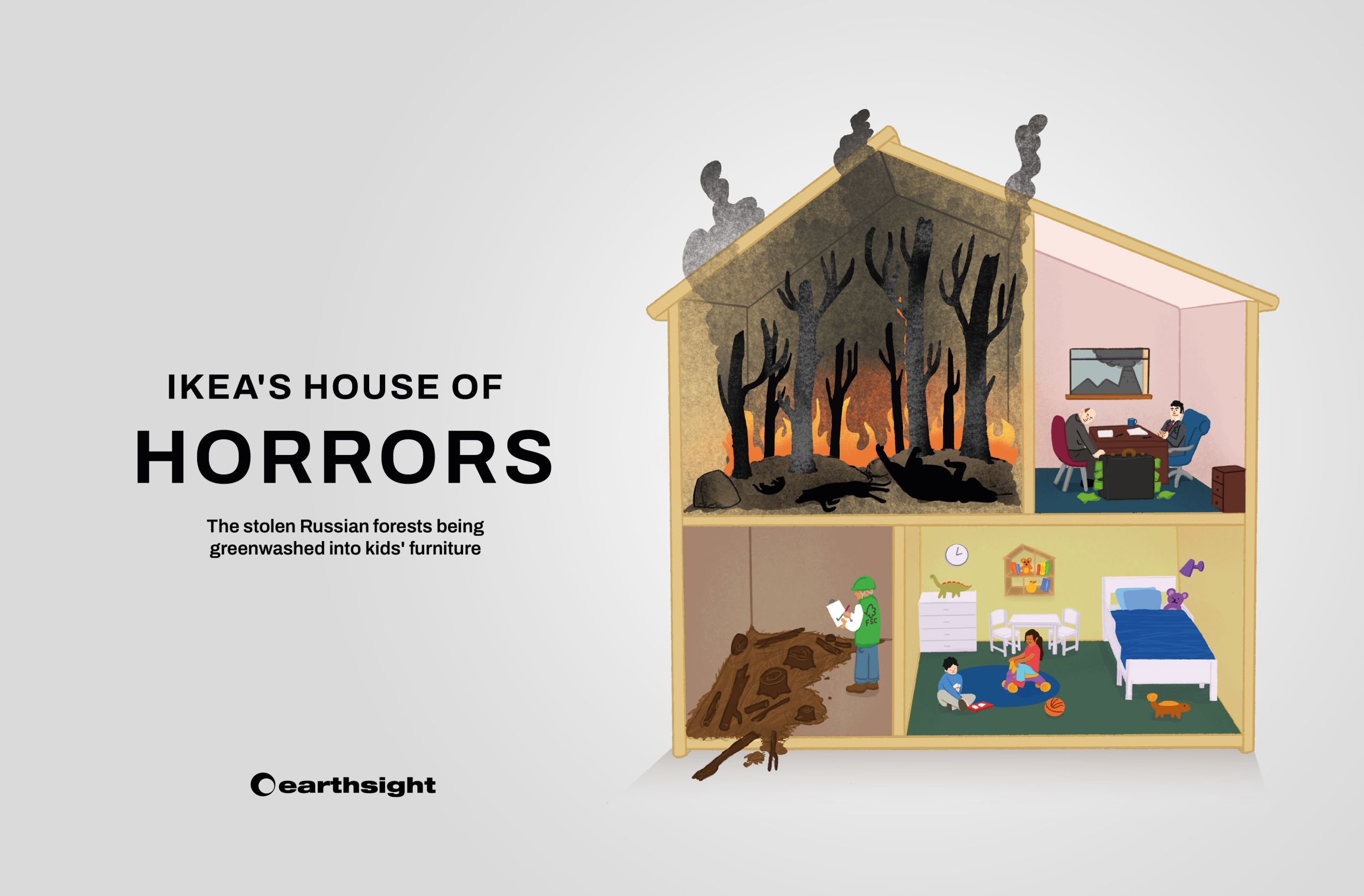
This is Evgeny Bakurov
Over the last decade, his companies cut down enough trees to build a near full-scale replica of the Great Pyramid of Giza
The wood came from protected forests in Russian Siberia
It ended up as children's furniture sold in Ikea stores around the world
Earthsight's year-long investigation reveals how this happened...
And who's responsible.
Key findings
- Ikea, the world's biggest furniture retailer, has for years sold children's furniture made from wood linked to vast illegal logging in protected forests in Russia, an Earthsight investigation has found. It is one of a number of western firms linked to the case.
- The brand's popular Sundvik children's range – which includes chairs, tables, beds and wardrobes – and Flisat doll's house are among the items likely tainted with illegal wood. Earthsight estimates that shoppers have been purchasing an Ikea product containing the suspect Russian lumber somewhere on earth every two minutes.
- Using undercover meetings, visits to logging sites, satellite imagery analysis and scrutiny of official documents, court records and customs data, we traced wood furniture on sale in Ikea stores around the world to forests in remote Siberia. They're controlled by companies owned by one of Russia's top-50 wealthiest politicians, Evgeny Bakurov.
- Our year-long investigation found that Bakurov's businesses broke numerous forestry and environmental laws. Illegal deals helped them harvest 2.16 million cubic metres of wood in protected forests over the last decade. Piled high, the logs produced would rival the Great Pyramid of Giza.
- Loggers felled millions of trees on the false pretext they were dead, dying, diseased or damaged – what's known as sanitary felling. Sick trees are often used as an excuse to flout Russia's logging laws.
- Bakurov's pine was certified by the Forest Stewardship Council (FSC), the leading global scheme for sustainable wood products, and shipped to an Indonesian manufacturer which supplies Ikea stores in countries including the US, UK, Germany, France and other European countries. Bakurov also supplied the retail giant through middlemen in Russia and China.
- Bakurov's tainted wood is also in many other supply chains heading to Europe and the US, aside from Ikea's. A majority of the EU's imports from eastern Russia are potentially contaminated.
- Earthsight holds FSC largely responsible for the logging abuses linked to Ikea and other retailers we connected to the scandal. They rely on the green label and its competitor PEFC to ensure their supplies are sustainable and legally sourced. Our findings provide further proof that this trust is wildly misplaced.
- FSC audits did not mention the rampant illegal logging documented by Earthsight and Russian authorities. Instead, high-risk wood continued to be sold in Ikea stores year after year.
- The findings show that governments in the US and Europe must enforce timber import laws more rigorously to address their roles in driving global deforestation.
- Ikea, which denies wrongdoing, announced a temporary ban on sanitary felled wood from Siberia and the Russian Far East after Earthsight got in touch. The retailer insists Bakurov's wood was "legally harvested" – but recently dropped his companies as suppliers, citing unspecified "practices of concern".
Prologue
The noise was deafening: a lumbering, wood-munching machine carving through the forest like a knife through butter. Trees in the Siberian province of Irkutsk Oblast had grown slowly, weathering biting winds and frozen winters for over a century. Under the mechanical grip of the Ponsse CTL harvester, they fell within seconds.
As the half-million-dollar machine automatically stripped the trunks of branches and sawed them into logs, Evgeny Bakurov looked on with satisfaction. Heavyset with closely cropped hair, the 44-year-old has the appearance of a heavyweight boxer. The rare visit into the taiga, to the forefront of his logging operation, made a welcome distraction from his usual milieu, hobnobbing with local business leaders and posing for photo-ops.
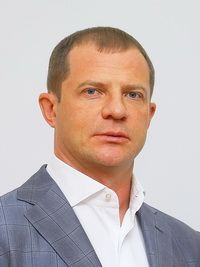
Evgeny Bakurov. Source: Irk.gov.ru
Evgeny Bakurov. Source: Irk.gov.ru
Control of an area of forest the size of Greater London has given him plenty. His own private helicopter, a boat named after his daughter, multiple properties and an income putting him in the top 50 highest-earning politicians or bureaucrats in Russia.
It has not been easy. Extracting profit from these woods is hard – or at least it would be, if you followed the law, which is supposed to ensure that rights to log are sold competitively at auction, that logging rates remain sufficiently low to allow the slow-growing forest to recover, and that the most ecologically important tracts are kept largely off limits.
But Bakurov, a businessman-politician whose macho image and penchant for martial arts draw obvious comparisons to the Russian President he so admires, has learned not to worry about the law. For over the course of a long career, Bakurov has mastered the tricks of his trade, which in the world of Russian forestry have little to do with efficient business practices. It is about cultivating allies. A few campaign donations can go a long way.
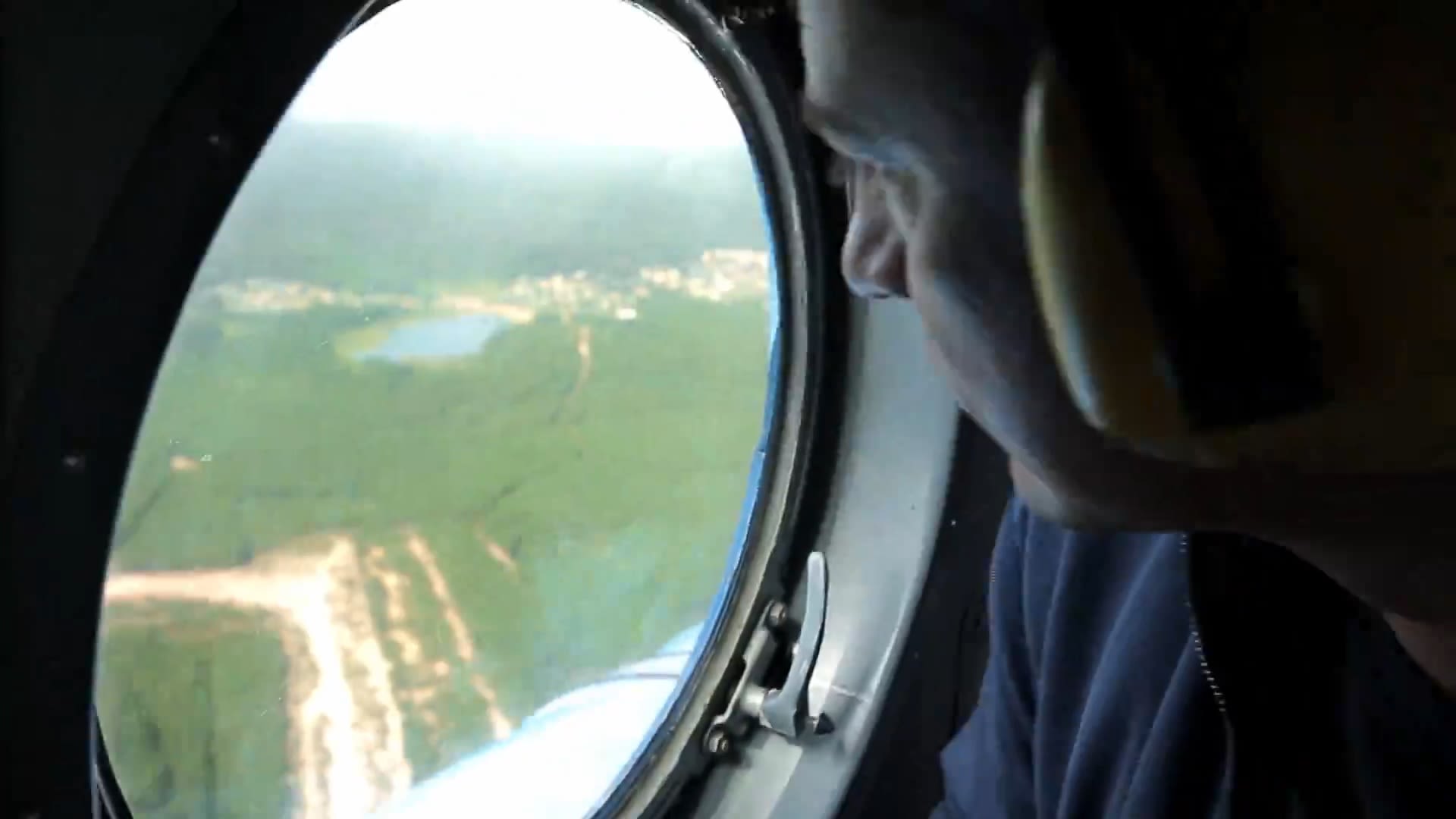
Bakurov aboard a helicopter flying over the Russian taiga. Source: ExportLes / Julia Kiseleva / YouTube
Bakurov aboard a helicopter flying over the Russian taiga. Source: ExportLes / Julia Kiseleva / YouTube
In his case this is hardly a secret. His companies left a long paper trail laying bare widespread illegal logging, including in protected forests.
Finding a market for all this wood, with the nearest coast a thousand miles away, has also been challenging. Doubly so given its illegal origin. But Bakurov has had a couple of powerful corporate allies overseas too, from distant Sweden and Bonn.
Thanks to them, it turns out, a trail leads from Bakurov's remote Siberian forest destruction to children's bedrooms all over the world. It is part of millions of people's 'Wonderful Everyday'.
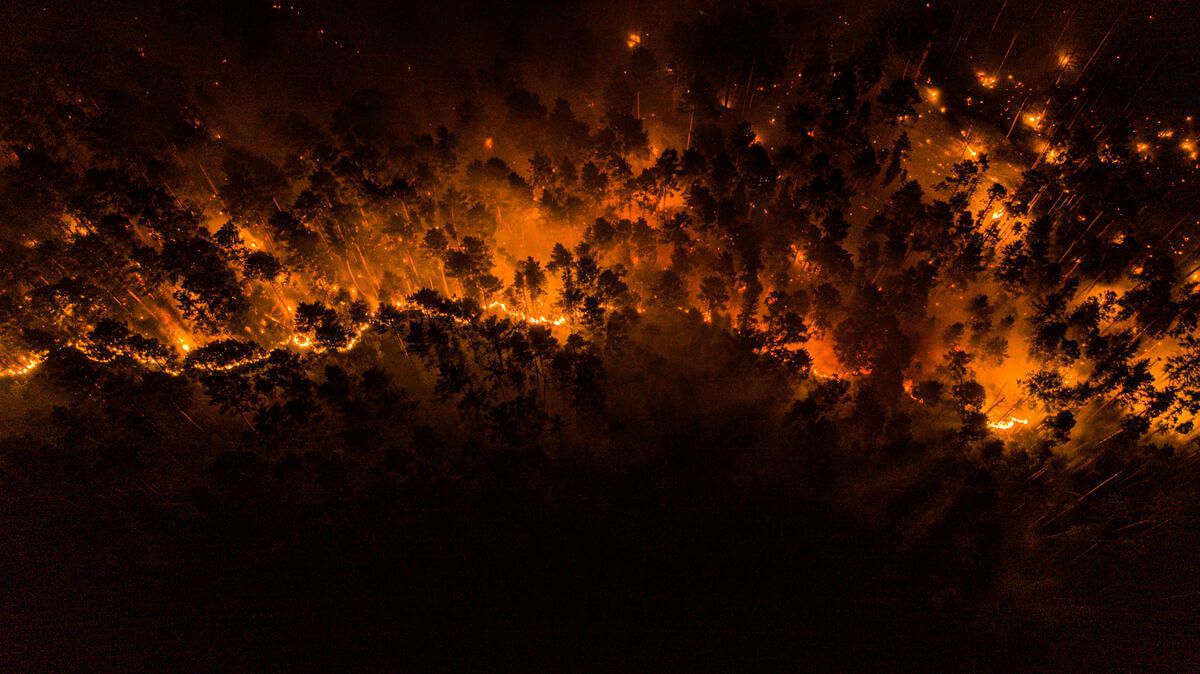
1. Siberia burning

Taming the taiga
Russia is one of the world's largest timber exporters and producers. In 2019, the former superpower overtook Canada to export more softwood lumber than any other country, and was on course to ship nearly a quarter of traded timber globally.
An incredible wealth of woodlands bless the country. Treetops cover nearly half of it, or more than 800 million hectares, knitting together Arctic tundra and vast eastern steppes in a tapestry of branches forming the largest forest on earth.
Europe and China form the biggest markets for this bounty. An increasingly throwaway culture, plus a rapid shift towards wood-fuelled electricity production and depleted domestic forests, have made Europeans turn to their giant neighbour to satisfy their hunger for cheap wood. European Union (EU) imports of logs, lumber, pulp, paper and other wood products from Russia are up 42 per cent in the last decade, nearing €3 billion per year.
In spite of the global economic shock caused by the Covid-19 (coronavirus) pandemic, this trade with the EU continued to grow last year, hitting a record high of 14.1 million tonnes – an amount which required the felling of approximately 200,000 trees per day.
"It may not be as high profile as Amazonian or Indonesian rainforest but the Russian boreal forest is hugely important"
In fact, the amount of Russian wood being consumed in Europe and many other countries is even larger than their direct imports suggest. That is because much of the Russian logs and lumber trundling across the border into China, the world's largest importer of timber, are re-exported, entering lucrative markets like Europe and the United States after being processed into finished goods like furniture and hardwood flooring. The US is the leading destination for wood product exports from China, valued at more than $9 billion in 2018.
While the European portion of Russia offers a ready supply of cheap wood, a significant share of exports come from Siberia and the Russian Far East.
Within these regions sprawls boreal forest or taiga, home to brown bear, wolves, elk and sable (a weasel-like mammal whose image adorns flags and coats of arms in Siberia). Here, the endangered Siberian Tiger, the world's largest, slinks silently between the tree trunks while flying squirrels leap and dart overhead. Sharp eyes may spot a white-tailed eagle soaring above the canopy, one of the largest living birds of prey.
"It may not be as high profile as Amazonian or Indonesian rainforest but the Russian boreal forest is hugely important," Nikolay Shmatkov, the former director of WWF Russia's Forest Programme, said in 2018. "It's crucial in regulating global climate – its trees, soils and peat store more carbon than all tropical and temperate forests combined – and are home to many large animals like forest reindeer that are disappearing from transformed and degraded forests."
The forests form a habitat for many, a lifeline for all – and they're dying.
Wildfires and climate change
Analysis by Global Forest Watch found that Russia lost 69.5 million hectares of tree cover since 2001. That's an area of forest the size of Texas. The land lost each year keeps getting bigger, with average annual losses in the 2010s double that of the previous decade. Last year was the second worst year on record for tree cover loss, according to the analysis.
Much of this deforestation is temporary. Unlike in the tropics, logging in boreal forests like those of Russia and Canada commonly involves the complete clearance (clearcutting) of chunks of forest which are then allowed to regrow. But even when such regrowth is taken into account, the data are stark. During 2001-12, Russia lost 36.5 million hectares but regained only 16.2 million hectares – a net loss of more than 20 million hectares.
"The main threat to Russian forests is the 'one-off' forest management model, in which the forest is used as a timber deposit, without efficient forestry," Alexey Yaroshenko, head of Greenpeace Russia's forestry department, told Earthsight. "In the vast majority of cases, the logged areas are simply abandoned to the mercy of fate without real concern about what will later grow on them."
With the remaining woodlands becoming increasingly degraded and fragmented, swathes of unbroken woodlands that scientists call 'intact forest landscapes' (IFLs) – each at least 500 square kilometres (or 70,000 football pitches) in size – break into shrinking archipelagos. Previously, the scale of IFLs ensured human impact was minimal. Torn apart, their native animal and plant life and natural processes are left exposed. Global Forest Watch analysis shows the vast majority of this forest loss is happening in eastern Russia, within the Russian Far East and Siberia.
The biggest cause of tree cover loss: fire.
"About 90 per cent of forest fires in Russia are caused by humans (I think that in reality it is even more)"
Fuelled by unusually hot conditions, colossal wildfires have been burning across Siberia, releasing record amounts of greenhouse gases. Choking clouds of ash and soot engulfed four Siberian regions in 2019, prompting a state of emergency and mobilising the military to help in firefighting efforts. The prolonged heatwave which hit the region in 2020, meanwhile, was "effectively impossible" without human-driven climate change, experts found.
More heat means more flames, which mean more permafrost melting and harmful gases released. And so the downward spiral continues.
Studies show increased logging activity in the Russian Far East and Siberia has also led to more frequent fires. Timber harvesting and logging roads fragment forests and make blazes more intense. The dried-out waste wood that loggers leave behind can act as tinderboxes, turning surface flames fuelled by leaf litter and low-lying vegetation into infernos that consume the whole canopy.
Yaroshenko said wildfires and loggers emboldened by weak official oversight are "acting together" to deplete Russia's forests and push logging into remaining reserves.
"It is generally believed that about 90 per cent of forest fires in Russia are caused by humans (I think that in reality it is even more)," he added. "A significant part of fires caused by humans are associated with hazardous practices in agriculture and forestry: the burning of logging residues during a dangerous period, the so-called 'controlled burning', which are often carried out without the necessary fire safety measures.
"In our experience, this is more [a result of] foolishness and carelessness than malice. We very often see fires occurring in felling sites or in the immediate vicinity of them."
Illegal logging hotspots
Widespread corruption among Russian politicians and the state officials in their pocket undermines good governance of forests. Logging is lucrative work, and a particularly important source of patronage and cash in the Russian Far East and Siberia. Even Russian president Vladimir Putin decried the "very corrupt" forestry industry during his annual news conference in 2019. The same year, the federal accounts chamber admitted that measures to tackle illegal logging "do not affect" the situation on the ground.
According to Greenpeace Russia's Yaroshenko, the Russian state has mounted a large campaign against illegal logging, but only in the narrowest sense of the term: commercial logging carried out without permits, which accounts for a small fraction of Russia's total annual timber production. He points out that "legal" or licensed felling often skirts the law, takes place on false or questionable grounds and results in the same devastating environmental impact as this unauthorised logging, but is far more common.
"Licensed or 'legal' logging in Russia often skirts the law"
The fact that large volumes of high-risk and illegally sourced wood from Russia end up in key consumer markets like the United States, EU and Japan is well documented. Despite some headline-making successes, however, such as a record $13 million fine issued for illegal Russian oak flooring found in the US, import laws in these countries meant to catch them don't seem to be working.
When the European Timber Regulation (EUTR), the bloc's flagship law on timber imports, came into effect in 2013, studies suggest that nearly as much stolen wood was entering its member states from Russia as from all tropical countries combined. Three years later, an EU-commissioned review of the legislation noted Russia was an increasingly prominent source of illegal wood, alongside Ukraine and Belarus. Guidance on EUTR made on the bloc's behalf identifies the Russian Far East and Siberia as hotspots for illegal logging.
In December 2020, Earthsight revealed how 100,000 tonnes of timber linked to Russia's largest illegal logging scandal this century had entered Europe. Our report noted that the case, though large, was unlikely to be exceptional. We were already researching yet another Russian logging scandal, and busy unearthing another route for suspect wood to leave the country.
Russia's illegal logging capital
The threats facing the Russian taiga – corruption, climate change, illegal logging – are most pronounced in Irkutsk oblast (province). Occupying an area almost twice the size of California, the Siberian heartland in east-central Russia is the country's largest producer of logs and lumber. It is characterised by broad valleys and rolling hills carpeted with dense forests of larch, pine, fir, spruce, aspen and birch.
The major railway connections in the province offer an easy means of dispatching huge numbers of logs to major ports and processing centres, including those in China. With quick money to be made, it's no surprise that the region has witnessed some of Russia's worst deforestation rates. More than a quarter of the net forest loss seen in Russia in the first 12 years of this century occurred in Irkutsk.
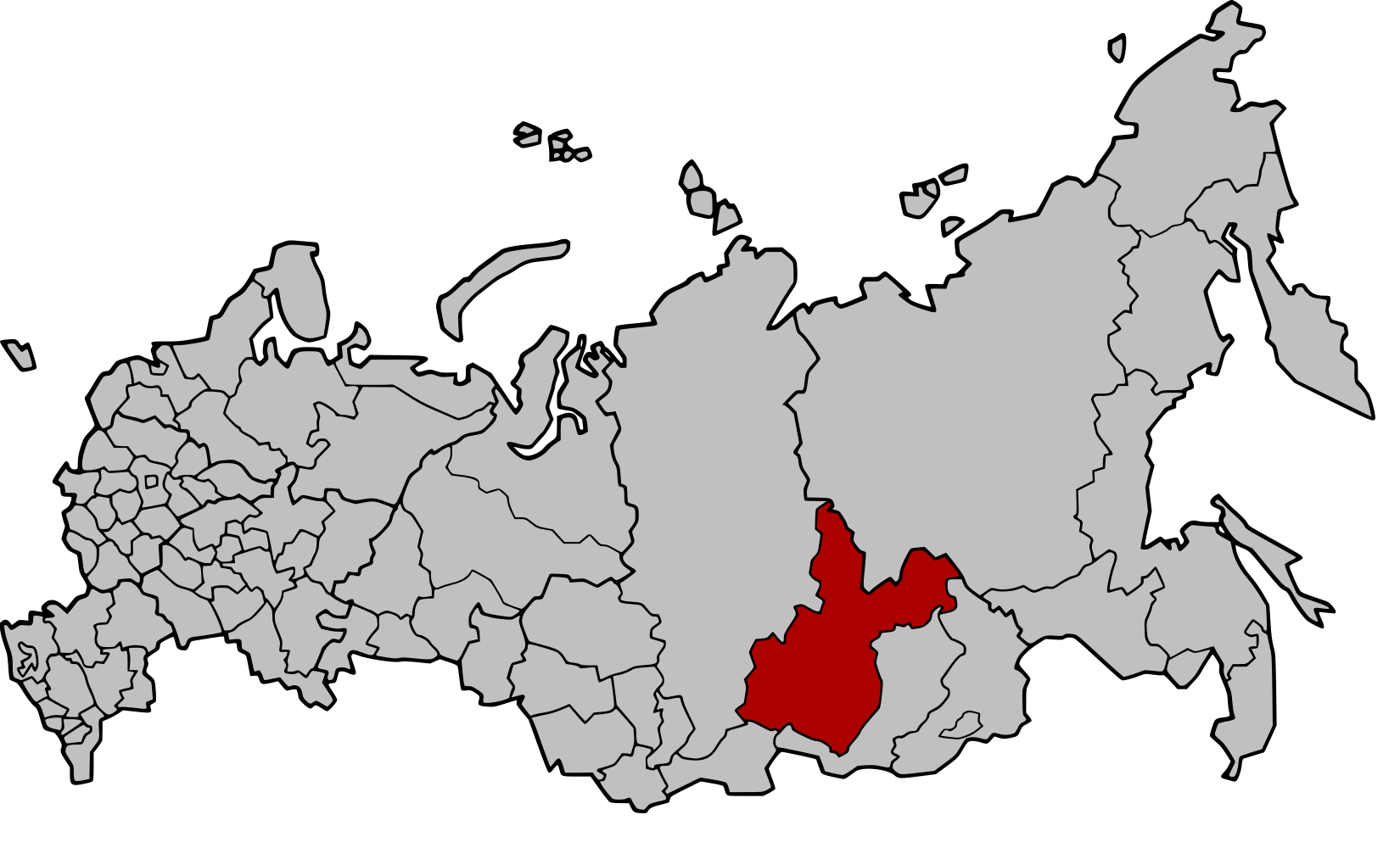
Irkutsk Oblast (red) in Russia. Image: Ezhiki / Wikimedia Commons (licensed under CC BY 2.5)
Irkutsk Oblast (red) in Russia. Image: Ezhiki / Wikimedia Commons (licensed under CC BY 2.5)
In Russia as in most heavily forested countries where it occurs, illegal logging is far from a clandestine activity. It is undertaken not by individuals but by large companies, using modern machinery. And it happens in plain sight, under the cover of legitimate harvesting. The wood is already laundered before the tree hits the ground.
In the former Soviet world, the most common ruse these companies use to illegally harvest and launder wood is 'sanitary' felling. Forestry regulations meant to ensure that cutting does not harm the forest can be circumvented on the grounds of stopping the spread of disease or pests. Companies abuse these rules to allow them to cut far more trees, in a far more destructive manner, than their logging licenses allow (see 'Russia's problem of illegal sanitary logging').
Russia's problem of illegal sanitary logging
Sanitary logging, also called salvage logging, is a common cover for illegal deforestation in Russia.
Click here to read more
Alexey Yaroshenko of Greenpeace Russia told Earthsight as much as 90 per cent of recorded sanitary logging in the country is "pseudo-sanitary", or carried out on false or questionable pretexts. This is supported by studies such as one by WWF in 2019, which found that 96 per cent of the planned sanitary felling sites it examined had been allocated improperly.
It is a big red flag, then, that Irkutsk oblast regularly produces more timber through sanitary felling than anywhere else in Russia. The province has a high-profile history of abusing these rules, and those charged with enforcing them a long history of turning a blind eye. In 2019, Irkutsk's top forestry official, Sergey Sheverda, was arrested for facilitating the illegal felling on false sanitary grounds of woodland in a nature reserve.
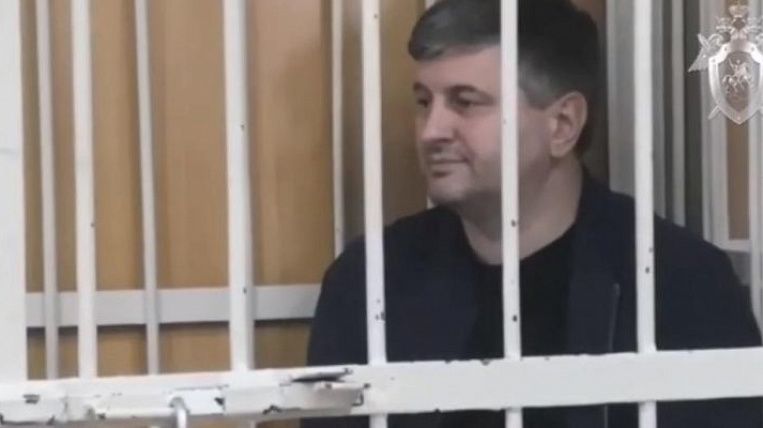
Irkutsk forest chief Sergey Sheverda, arrested in 2019 for facilitating illegal sanitary felling. Photo: Investigative Committee of the Russian Federation
Irkutsk forest chief Sergey Sheverda, arrested in 2019 for facilitating illegal sanitary felling. Photo: Investigative Committee of the Russian Federation
2. The heist
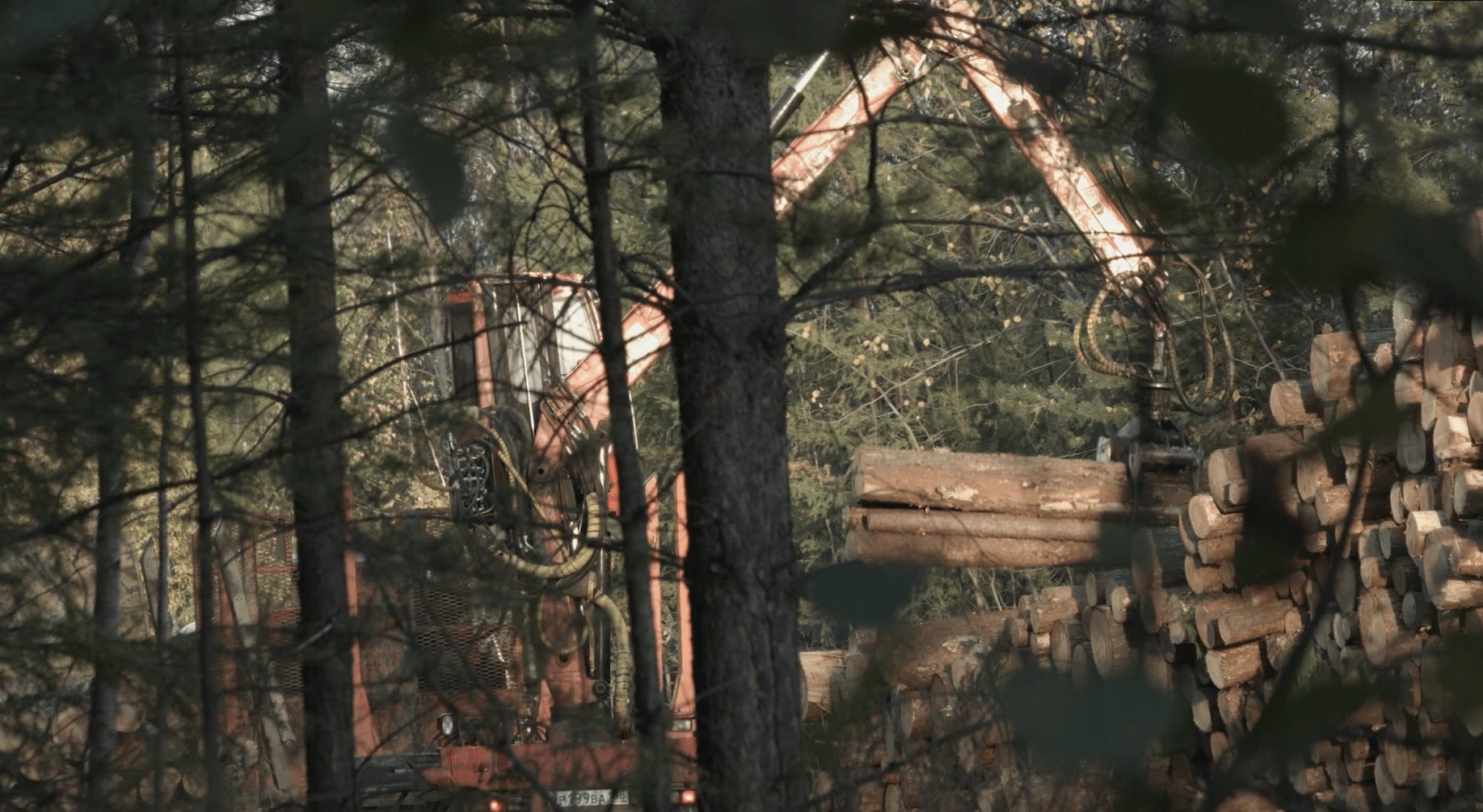
Evgeny Bakurov, logging baron
Evgeny Bakurov, 44, is not everyone's picture of a typical civil servant. His stocky frame and penchant for self-promotion differ dramatically from the stereotype of faceless pencil-pushers trudging up and down the corridors of power. As does his apparent fondness for being photographed shirtless.
The elected member of Irkutsk Oblast's legislative assembly ranked 44th on a Forbes list of Russia's highest-earning civil servants or legislators in 2019, with a declared income of 365 million roubles (more than $5 million). His most recent declaration of assets included 71 plots of land and a Gazelle AH Mk 1 military helicopter.
Climbing high above the treetops, roaring into the taiga, his chopper offers spectacular views of the source of Bakurov's wealth: wood. Bakurov is well-known locally for controlling the ExportLes (Russian for "Export Forest") group of forestry firms (see 'The Bakurov empire'), whose forest leases span an area bigger than London. He also serves as president of the region's timber trade body.
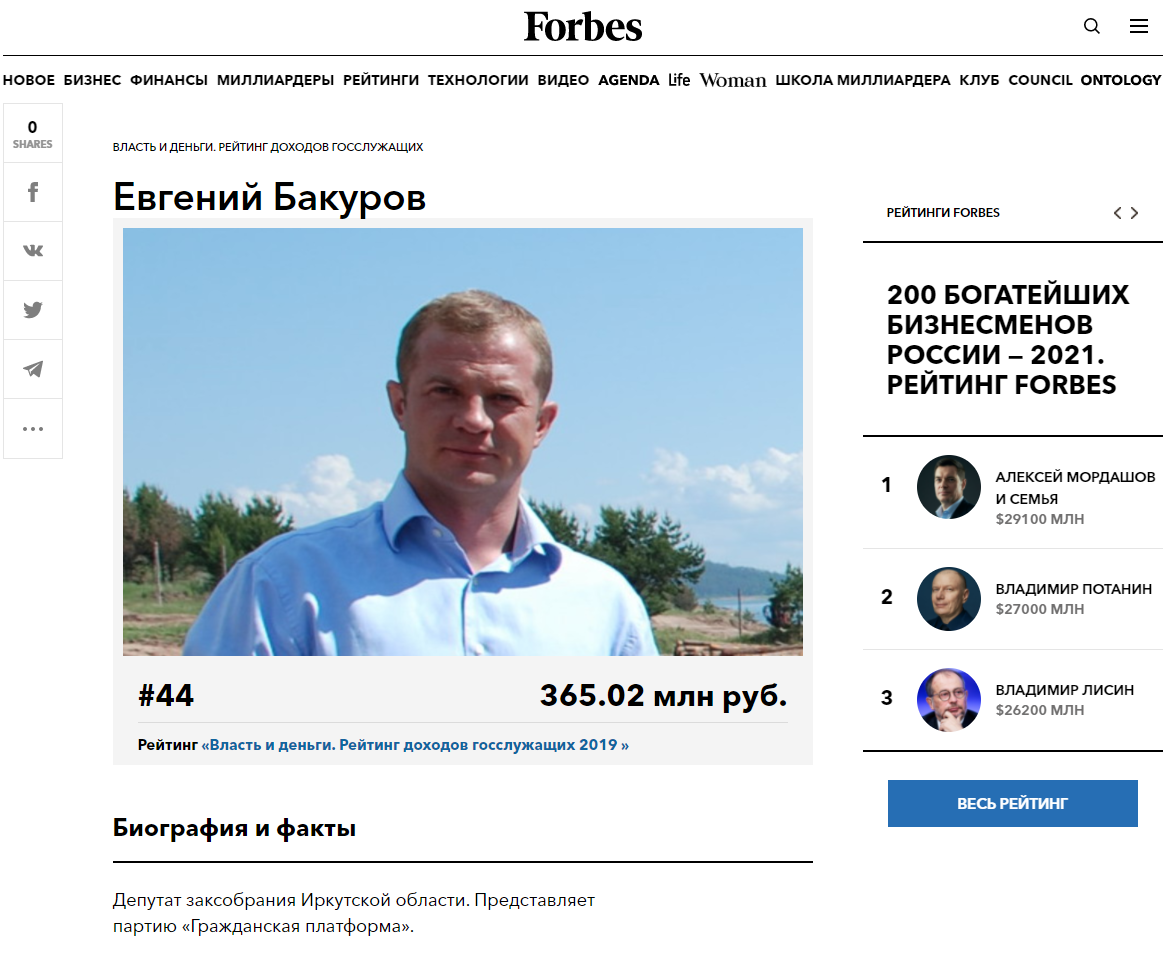
Evgeny Bakurov ranked 44th on a Forbes list of Russia's highest-earning civil servants or legislators in 2019. Source: Forbes.ru
Evgeny Bakurov ranked 44th on a Forbes list of Russia's highest-earning civil servants or legislators in 2019. Source: Forbes.ru
If the 2016 promotional video for the ExportLes group is to be believed, Bakurov is a responsible, if eccentric, guardian of nature. It features close-ups of certificates issued to his companies by a global body that vets wood suppliers, the Forest Stewardship Council (FSC), and shots of his workers combatting wildfires. Other, more unconventional footage sees Bakurov boxing and swinging shirtless on an exercise bar.
Perhaps inspired by Russian President Vladimir Putin, Bakurov is known for macho stunts. Take the YouTube video of him posing for tourists' cameras wearing only a pair of red swimming shorts. Or his profile on VK, the social media platform popular in Russia, which features a picture of him beside a chained tiger. Or his honorary chairmanship of the local Shotokan karate club, for which, according to a recent profile in Russian publication Verblud V Ogne, he rarely trains but promotes locally and to which he "provides material assistance".
There is also the documentary about his World War II veteran grandfather Vladimir, screened at Evgeny's expense in several Russian cities, in which the pair's lavishly shot boating trip serves as another excuse for Evgeny to bare his torso.
"People like me don't drown," the grandson declares before jumping into the water to showcase his butterfly stroke. His political career, so far, has proved him right.
The Bakurov empire
In public promotions fronted by Bakurov, his group of companies is referred to under the overall brand 'ExportLes Group'. There is no legal entity of that name, however.
Earthsight has identified 16 different registered Russian companies which are either owned, managed or closely connected to Bakurov.
Click here to read more

Evgeny Bakurov's forest estate in Irkutsk Oblast, Russia © Dirk Wright for Earthsight
Evgeny Bakurov's forest estate in Irkutsk Oblast, Russia © Dirk Wright for Earthsight
Lawless logging
Razing forests without anyone noticing used to be easy in Irkutsk province. It is remote, with few roads snaking into the seemingly endless taiga. Until recently, guard posts like the illegal ones Bakurov set up to block access to the forest leases controlled by his companies Vilis and Vertical-B were enough to keep unwanted eyes at bay. Not anymore. The dawn of publicly available court papers and high-quality satellite imagery make it impossible for illegal deforesters to hide their activities.
Drawing on these and other sources as well as our own field investigations, Earthsight established that Bakurov's companies have been systematically flouting environmental and forestry laws for years.
The argument made worldwide is that logging can be made 'sustainable' and not damaging to forests or the wider environment long term, so long as strict rules are followed. In keeping with this, Russia has detailed regulations limiting licensed logging. The volumes allowed to be harvested in a given area each year – the 'annual allowable cut' or AAC – are carefully controlled. The most important areas of forest for the environment or wildlife within a given lease area are placed off limits. Logging methods must follow strict parameters in order to reduce damage to surrounding forests and soils. Loggers must dispose of their waste carefully. They must also take specific actions to promote regrowth: sowing seeds, planting seedlings and leaving some mature seeding trees standing.
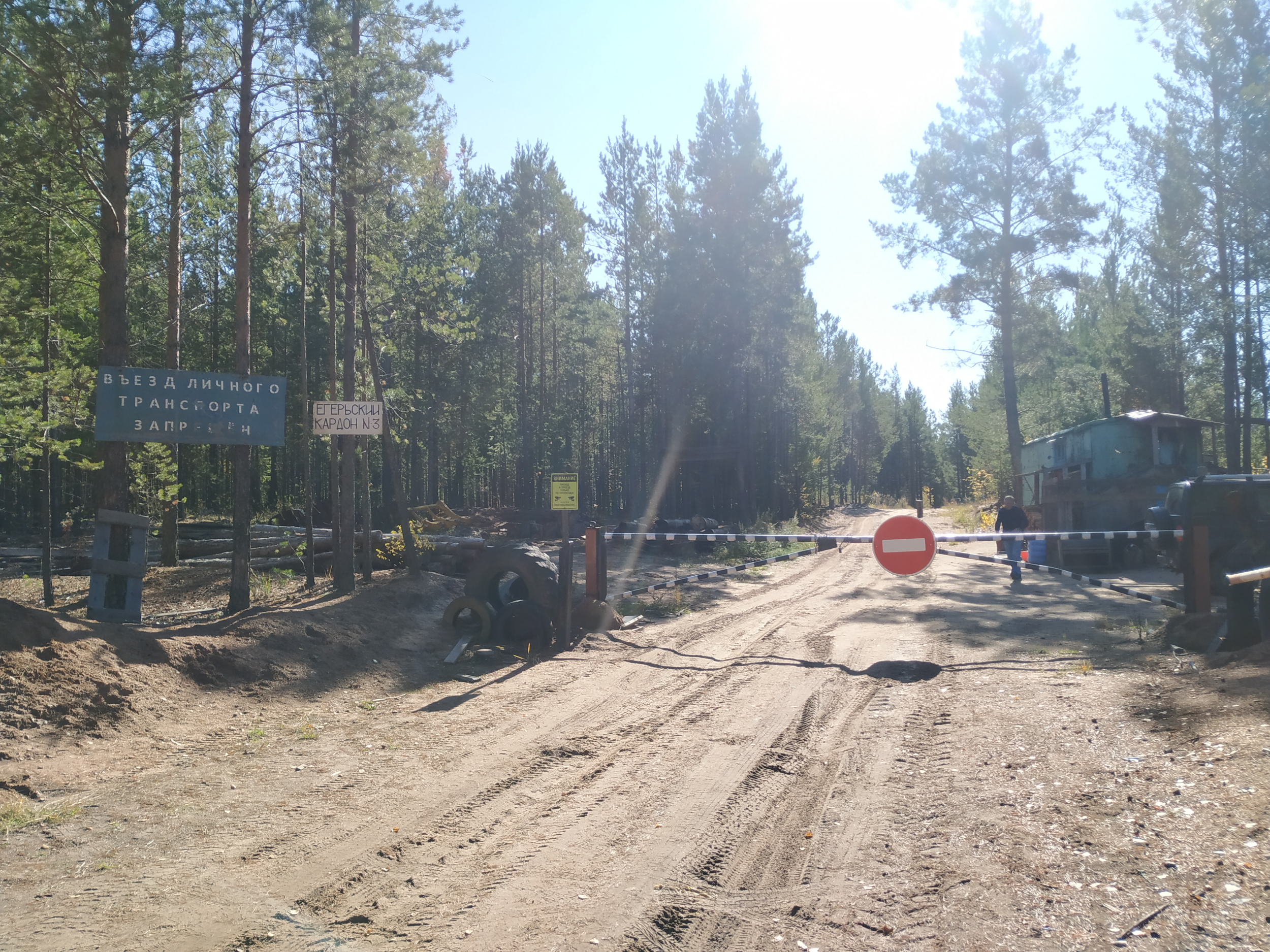
Checkpoint illegally blocking access to Vilis LLC logging leases in Irkutsk Region, Russia © Earthsight
Checkpoint illegally blocking access to Vilis LLC logging leases in Irkutsk Region, Russia © Earthsight
Our evidence shows that all five of Bakurov's logging firms – Vilis, Vertical-B, DeepForest, Noviy Les and Bratskwood – have systematically flouted every one of these rules.
Vast tracts of protected woodlands were illegally felled under the false pretext that the trees were diseased or dying. Doubly-protected trees along the banks of rivers and lakes, critical for fish-spawning and erosion control, were clear-cut in their hundreds of thousands. Forests were turned into tinderboxes by the illegal abandonment of huge volumes of logging residues. Riverbanks and shorelines were torn to pieces with heavy machinery. Almost none of the required steps to promote regrowth were carried out.
The overall scene resembles a Russian nesting doll of illegal logging, where dodgy deals unravel and reveal crimes inside crimes inside crimes.
Earthsight asked Alexey Yaroshenko, the head of Greenpeace Russia's forestry department, to confirm our assessment. We asked whether the actions of Evgeny Bakurov's companies broke the law. His reply? "It seems to me that the report gives a completely unambiguous answer to this question: yes."
It is a bitter irony that Bakurov, the same man who decried black lumberjacks enriching themselves by "robbing the country", has presided over the wholesale looting of his region's natural resources.
Earthsight estimates that his companies illegally extracted 2.16 million cubic metres of wood from protected Siberian forests over the last ten years. That is the remains of some 4 million trees, many of them over 150 years old. Piled high, the logs produced from them would rival the Great Pyramid of Giza.
Lead into gold – the illegal deals
The laws his firms have broken are many and varied. But at the heart of this story – and Bakurov's transformation from two-bit nobody into a multimillionaire politician – is one key trick. Evgeny has mastered the art of turning lead into gold.
The process has several stages. First, Bakurov obtains cheaply at auction a license to cut a small number of trees each year (or buys a company which already has one). Then, by nefarious means, he gets the license illegally amended – sometimes multiple times – to allow him to harvest far, far more trees. Even trees within nominally protected and highly sensitive ecological zones are not spared. Once the forest is stripped, he begins the process anew: new company, new forest, new lease, new amendment. By the time the authorities catch up with him, nothing but stumps remain.
Irkutsk territory's arbitration court database lists eleven such cases initiated by regional prosecutors between 2014 and 2020 against the five Bakurov firms. It shows the provincial forest management agency repeatedly bypassed Russia's legally mandated public bidding process (see 'Why the lease changes were illegal') to illegally sign additional agreements to Bakurov's forest lease deals. Judges would later invalidate the amendments in a series of rulings.
Why the lease changes were illegal
Under Russian law, you can't chop down a forest just because a bureaucrat lets you.
Click here to read more
What may sound like a dry legal dispute was, in environmental terms, a disaster. The additional agreements, agreed between September 2012 and July 2018 and covering eight different forest leases, essentially permitted a logging free-for-all across 132,000 hectares of woodland – 85 per cent (111,700 hectares) of which was protected forest.
The deals broke forestry laws by allowing an additional 689,000 cubic metres of timber to be harvested over a short period of time, far more than the roughly 90,000 cubic metres per year allowed originally (of which 40,000 cubic metres was unprofitable 'thinning' of small trees – see table above). Nearly all the added harvest would come from nominally 'protected' forests.
With the illegal additional lease agreements signed, all pretence of responsible forest management went out of the window. The deals permitted a huge expansion of logging, overwhelmingly in the form of clear-cuts and other extensive harvesting said to be needed to save protected trees.
Falsified reports
Because they had breached competition and other laws, the lease amendments would have been illegal even if the felling had been justified. However, they were doubly illegal because the available evidence indicates that the forests concerned were not unhealthy at all.
Details contained in the arbitration court database and inspection reports from the Siberian federal district's forestry department, whose authority includes Irkutsk province, show Bakurov companies DeepForest, Vertical-B and Vilis repeatedly failed to conduct a legally required forest health study before felling trees on the excuse of fighting pests or disease. Under the tight rules that govern sanitary logging in Russia, the country's federal forest agency must first review an expert report known as a "forest pathology act" that recommends trees be removed (see 'How forest pathology acts work'). But, across four lease areas, there was no evidence that any such study had ever taken place.
How forest pathology acts work
If pests or disease take root in a Russian forest, a professional known as a forest pathologist can carry out a tree health check.
Click here to read more
Court files suggest the lack of forest pathology acts was not an oversight. When the arbitration court in 2014 considered a prosecutor's claim to cancel an additional agreement concerning DeepForest, company representatives presented forest pathology acts as supposed proof to justify extensive clear-cutting in the forest lease concerned.
But the acts proved to have been deliberately falsified by Irkutsk's Ust-Udinskiy district forestry chief Yuri Titov, who in May 2021 was sentenced to four and a half years in prison for abuse of office related to the affair. He is serving his sentence in a penal colony.
The Titov affair received attention in Irkutsk. In April 2015, regional prosecutor Igor Melnikov cited the case as evidence of an escalation of sanitary felling acting as a cover for commercial deforestation across the region.
"Bakurov's companies' rapacious logging bore little relation to forest health"
The arbitration court files and Siberian federal district's inspection reports certainly confirm that Bakurov's companies' rapacious logging bore little relation to forest health. According to the documents, there was no basis for the clear-cutting they conducted on sanitary grounds, and any selective felling on the same pretext was either not needed or, in one forest lease, only justified for a tiny share (3.3 per cent) of the additional wood allowed to be harvested there.
In November 2018, the district court in Bratsk banned logging in the lease concerned, after a joint inspection by local prosecutors and an independent forest pathologist found one of Bakurov's companies had cut down "viable stands under the guise of damaged trees".
'People like me don't drown'
Evgeny was not the only local timber baron to discover this trick. But he exploited it like no-one else, and proved more adept at staying ahead of the law.
It didn't take too long for the authorities to cotton on to what was happening with illegal sanitary logging in Irkutsk. But it would take much longer for their efforts to bear fruit. In 2014, the same year that the first of Bakurov's dodgy lease amendments was declared illegal by a court, Irkutsk's regional prosecutor Igor Melnikov publicly acknowledged that protected forests were being "savagely destroyed" through secretive and unnecessary clearances. He alleged that the leadership of the local forest authorities were complicit, including in the deliberate falsification of forest pathological inspection reports. He said he and his colleagues were stamping out the problem, having ripped up more than 100 sanitary logging contracts through suits filed in Irkutsk province's arbitration court and hauled 17 forestry officials before antitrust authorities.
Official data does show sanitary logging fell dramatically across the province between 2012 and 2014, and – following a second wave – fell again from 2018 to August 2020. But on both occasions, one businessman notorious locally for this very crime proved able to buck the trend.
The peak year for sanitary logging in Irkutsk was 2018, at which point Bakurov's firms were responsible for about six per cent of the total amount of such cutting in the province. As the most recent crackdown took hold the following year, the amount of sanitary logging fell by 70 per cent. But Bakurov's firms proved immune. As a result, by 2020 they would end up with a near-monopoly on the pseudo-sanitary logging business. That year, their share would exceed two-thirds.
"When prosecutors defeated one agreement in court, another popped up"
It seemed Evgeny the strongman's claims about being a survivor were no idle boast.
Despite the best efforts of prosecutors to shut down the destruction, nearly all the arbitration suits against Bakurov's firms were filed roughly two to three years after an additional lease agreement was signed. By that time, tens of thousands of trees had already been felled. Meanwhile Evgeny was busy repeating his trick. The process locked prosecutors in a desperate game of whack-a-mole: when they defeated one agreement in court, another popped up.
Lengthy court disputes also bought Bakurov and his cronies time to drive deeper into protected forests before someone stopped them. The regional prosecutors' office applied for an interim ban on logging pending a court decision in only three of the 11 cases, and were successful twice.
The loggers, by comparison, delayed and delayed. They appealed six arbitration decisions, each challenge adding another four months on average to keep cutting trees.
With extraordinary chutzpah, in one case the company's lawyers sought to argue in their defence that there was no point overturning the amendment, because most of the trees had already been cut.
Earthsight's analysis of satellite images shows that illegal deforestation continued in protected forests controlled by Bakurov's companies even after their appeals failed.
It was theft in its purest form.
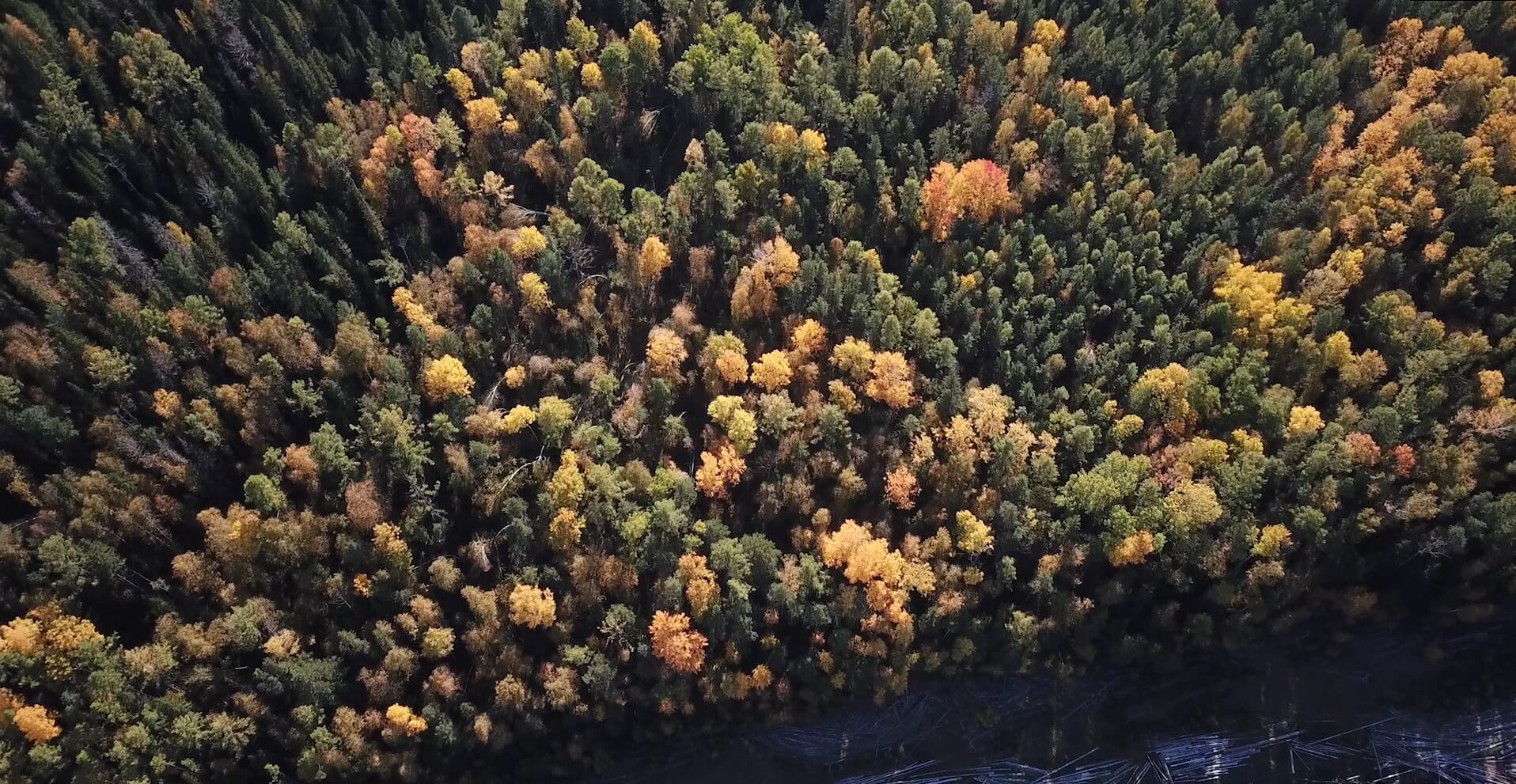
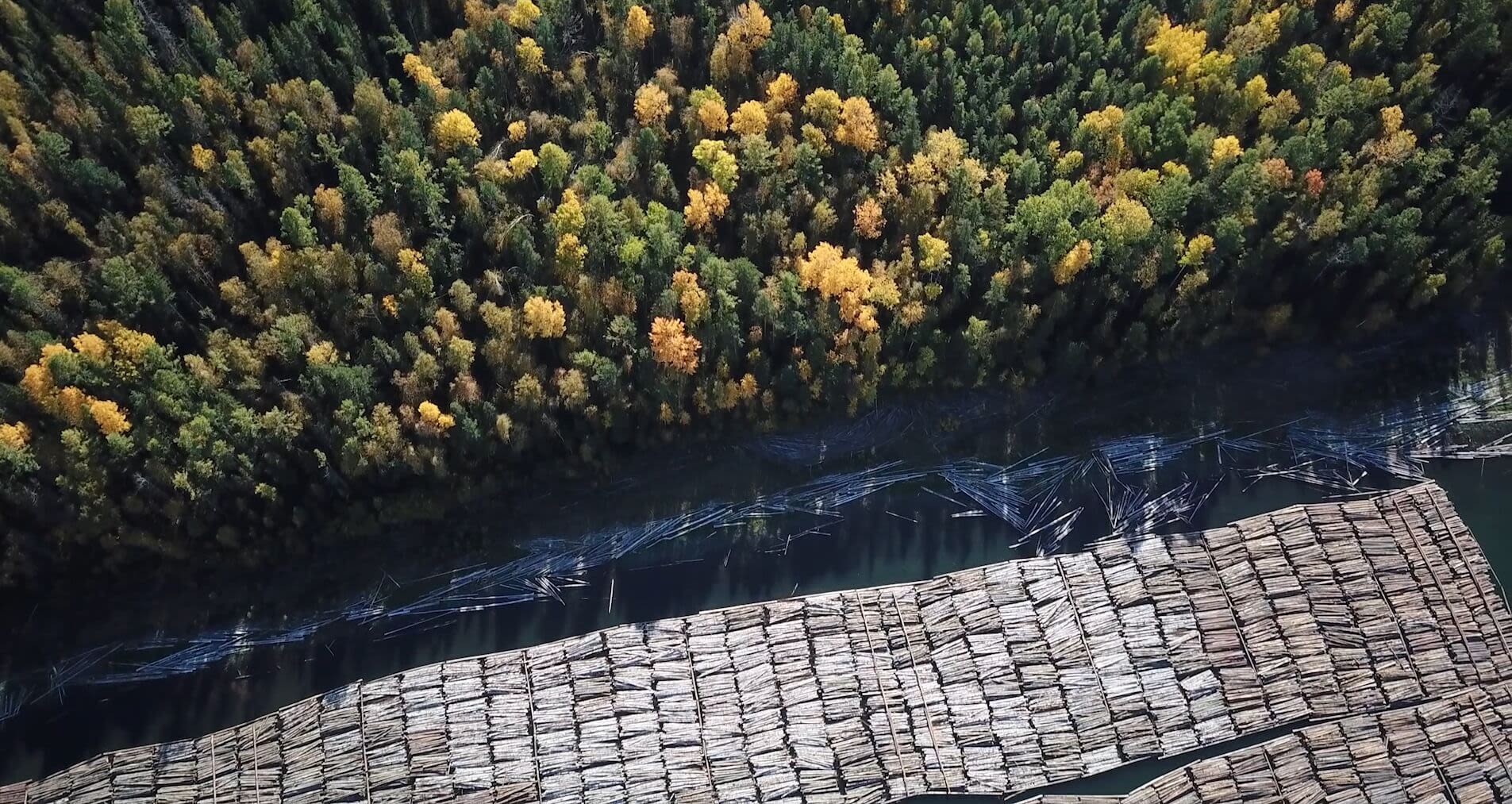
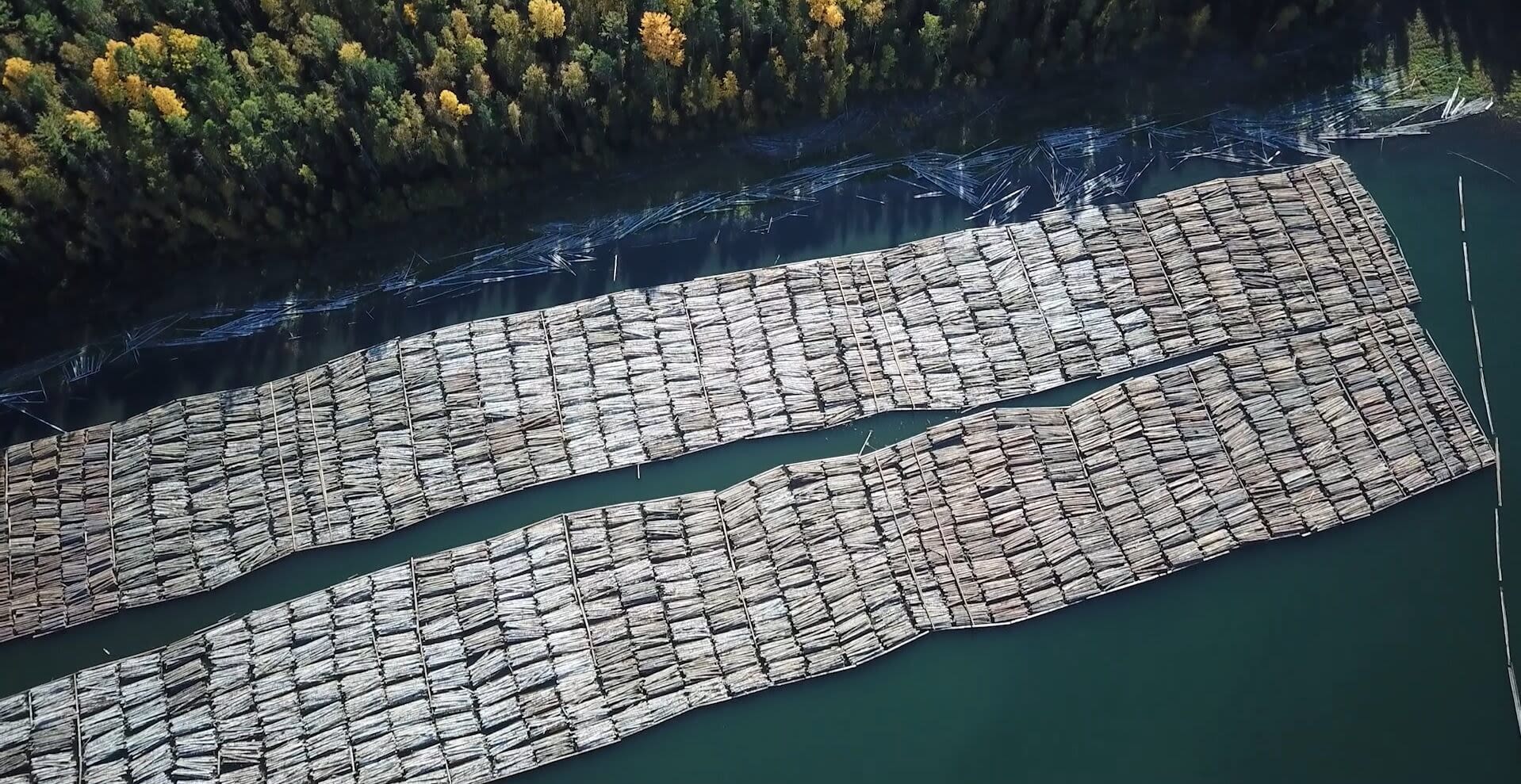
Both Vertical-B and Vilis continued to cut down trees in protected forests after losing their respective appeals. The well-publicised original ruling against Vertical-B made its actions particularly brazen: local environmental prosecutors had celebrated victory over the company in a press release picked up by local media outlets.
But less than a fortnight after the appeals court ruling, in June 2019, long lines of cut trees began appearing in one of Vertical-B's forestry sites, near Polyanka Bay.
Sentinel satellite images taken every few days revealed fresh clearances sprouting from new logging roads. Within a month, a professional operation had emerged with the site sporting skid trails for dragging logs across the forest floor. Felled trunks could then be hauled down a track connected to the waterway and loaded onto transport boats. Several satellite pictures appear to show barges in the bay or docked at the foot of the track.
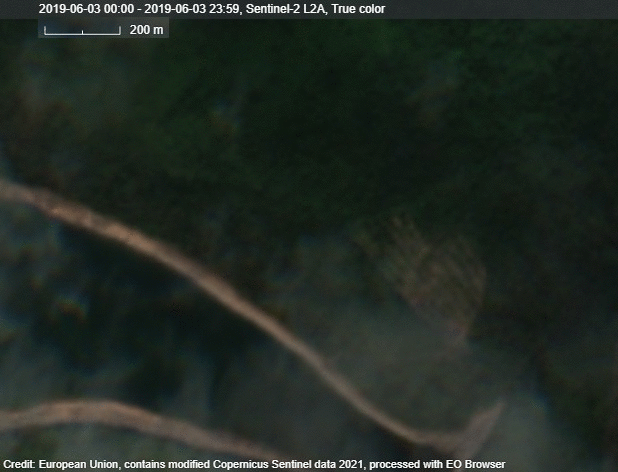
Satellite images taken from 3 June 2019 to 1 July 2019 show trees were felled in protected forests within Vertical-B lease 91-21-3, near Polyanka Bay, after the company lost an appeal against the regional arbitration court's ruling. Satellite imagery: European Space Agency (ESA) Copernicus Sentinel / via Sentinel Hub
Satellite images taken from 3 June 2019 to 1 July 2019 show trees were felled in protected forests within Vertical-B lease 91-21-3, near Polyanka Bay, after the company lost an appeal against the regional arbitration court's ruling. Satellite imagery: European Space Agency (ESA) Copernicus Sentinel / via Sentinel Hub
A similar scene emerged later that summer, when satellite images captured logging at a Vilis forestry site nearly 45 miles away. After Irkutsk's Fourth Arbitration Court of Appeal on 6 August 2019 upheld the ruling against the company, regular rows of stumps appeared beside a skid trail running to the Angara River. Satellite images suggest felling continued until 15 August 2019, when one image captured what appears to be a barge docked at the riverbank.
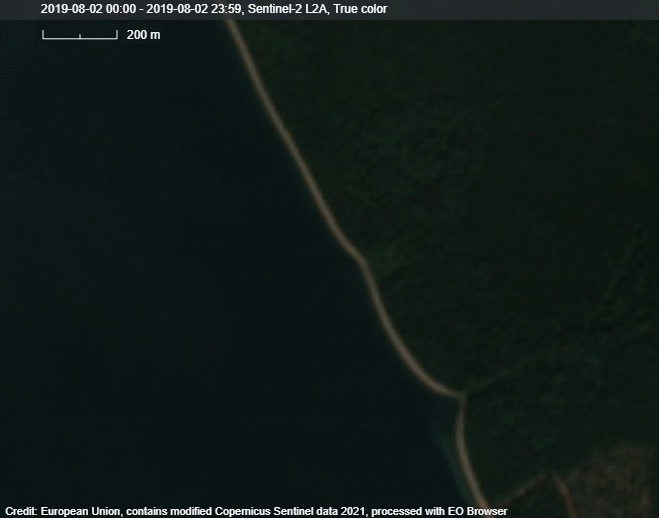
Satellite images taken from 2 to 15 August 2019 show trees were felled in protected forests within Vilis lease 91-1/9, by the Angara River, after the company lost an appeal against the regional arbitration court's ruling. Satellite imagery: European Space Agency (ESA) Copernicus Sentinel / via Sentinel Hub
Satellite images taken from 2 to 15 August 2019 show trees were felled in protected forests within Vilis lease 91-1/9, by the Angara River, after the company lost an appeal against the regional arbitration court's ruling. Satellite imagery: European Space Agency (ESA) Copernicus Sentinel / via Sentinel Hub
Then, in the winter of that year, there were yet more blatantly illegal clearances, this time in a spawning site along the Ilim River. The third and final offender, DeepForest, continued to cut trees in secret for weeks after the regional forest ministry imposed a logging ban in the area, while the court case involving the lease amendment was pending. Satellite pictures show trees were felled from December 2019, when the ban was issued, until February 2020.
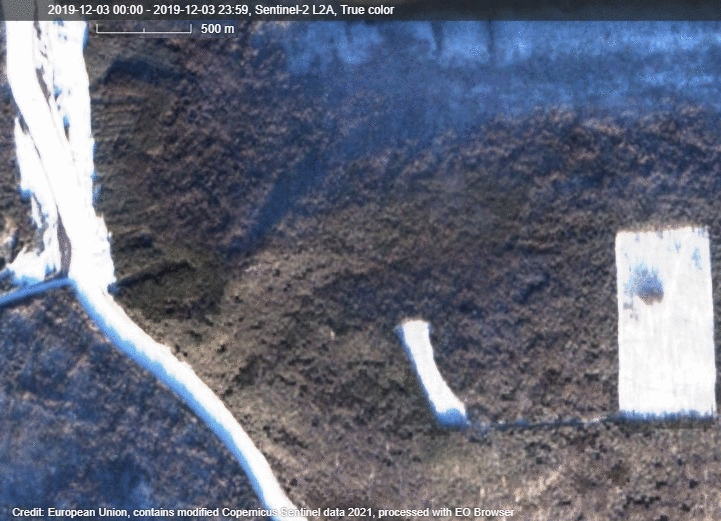
Satellite images taken from December 2019 to February 2020 show trees were felled in DeepForest lease 91-295, along the Ilim River, after Irkutsk Region's forest ministry banned logging during an arbitration dispute over the land. Satellite imagery: European Space Agency (ESA) Copernicus Sentinel / via Sentinel Hub
Satellite images taken from December 2019 to February 2020 show trees were felled in DeepForest lease 91-295, along the Ilim River, after Irkutsk Region's forest ministry banned logging during an arbitration dispute over the land. Satellite imagery: European Space Agency (ESA) Copernicus Sentinel / via Sentinel Hub
Protected forests plundered
It turns out that even the massive windfall from the illegal amendments was not enough to sate Bakurov's appetite for timber. To find out just how badly his activities had affected protected forests within his forest leases, we analysed satellite images going back over a decade.
Bakurov's companies control 13 forest leases with a combined area of more than 220,000 hectares, representing an empire bigger than London. Half (51 per cent) of this area – or roughly 112,000 hectares – lies in protected forests spanning shorelines, streams and sources of drinking water.
Using remote-sensing data from satellites, Earthsight tracked deforestation in 10 of the 13 forest leases over a period longer than a decade. The study area, more than 200,000 hectares, accounted for most of the land under Bakurov's control, and includes all eight leases where illegal amendments were made.
We discovered that 14,600 hectares of protected forest controlled by his five firms were felled from 2009 to August 2020 – 79 per cent of the total area logged over the period. More than half of this logging in protected forest was the most devastating and environmentally damaging kind – clear cuts. As the area under Bakurov's control grew, so did the area of nominally protected forest being damaged and destroyed, peaking in 2019.
Based on the area logged or deforested and the intensity of logging, Earthsight estimates that Bakurov's five firms cut 2.16 million cubic metres of wood in protected forests from January 2011 to August 2020. That is more than three times the volume allowed by the illegal lease amendments. It is wood worth almost a quarter of a billion US dollars.
The only way any such logging could have been even remotely legal was if it were being carried out for reasons of forest ill-health. There is a fair chance it was just blatant criminality. According to Greenpeace, felling in excess of licensed harvests is even more common in Russia than 'pseudo-sanitary' felling.
It is also possible that additional permissions for such harvesting were given, which neither we – nor, it would seem, local prosecutors – are aware of. But even if that were the case, what odds would you get that the forest concerned was truly sick?
We can be more certain about the illegality of much of this logging, however, because the satellite images show that it took place in forests close to the shores of rivers and the Bratsk reservoir. Recognising their crucial ecological value as spawning, feeding and wintering grounds for fish and other aquatic life, as well as for erosion and flood control, legislation prohibits felling in zones within 200 metres of such shorelines.
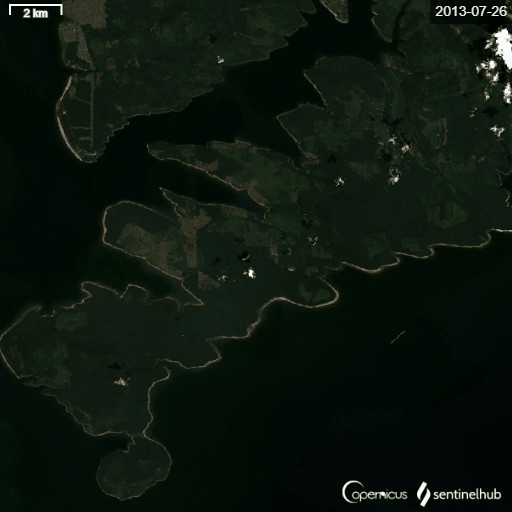
Satellite images taken from 2013 to 2020 show logging in Vilis forest lease 7-09 near the shores of rivers and the Bratsk reservoir. Satellite imagery: European Space Agency (ESA) Copernicus Sentinel / via Sentinel Hub
Satellite images taken from 2013 to 2020 show logging in Vilis forest lease 7-09 near the shores of rivers and the Bratsk reservoir. Satellite imagery: European Space Agency (ESA) Copernicus Sentinel / via Sentinel Hub
Even if the forest is diseased, only selective felling is permitted. Yet the satellite images reveal dozens of locations within the Bakurov forest estate where clear-cuts took place in such areas. These were not small offences. One such illegal clearcut covered an area larger than 50 football pitches and extended along the coast for three kilometres. They were also blatant. In some cases, a thin 'screen' of trees was left close to the bank, perhaps to hide the illegal felling from sight. But in many places, the clearances went right down to the shoreline.
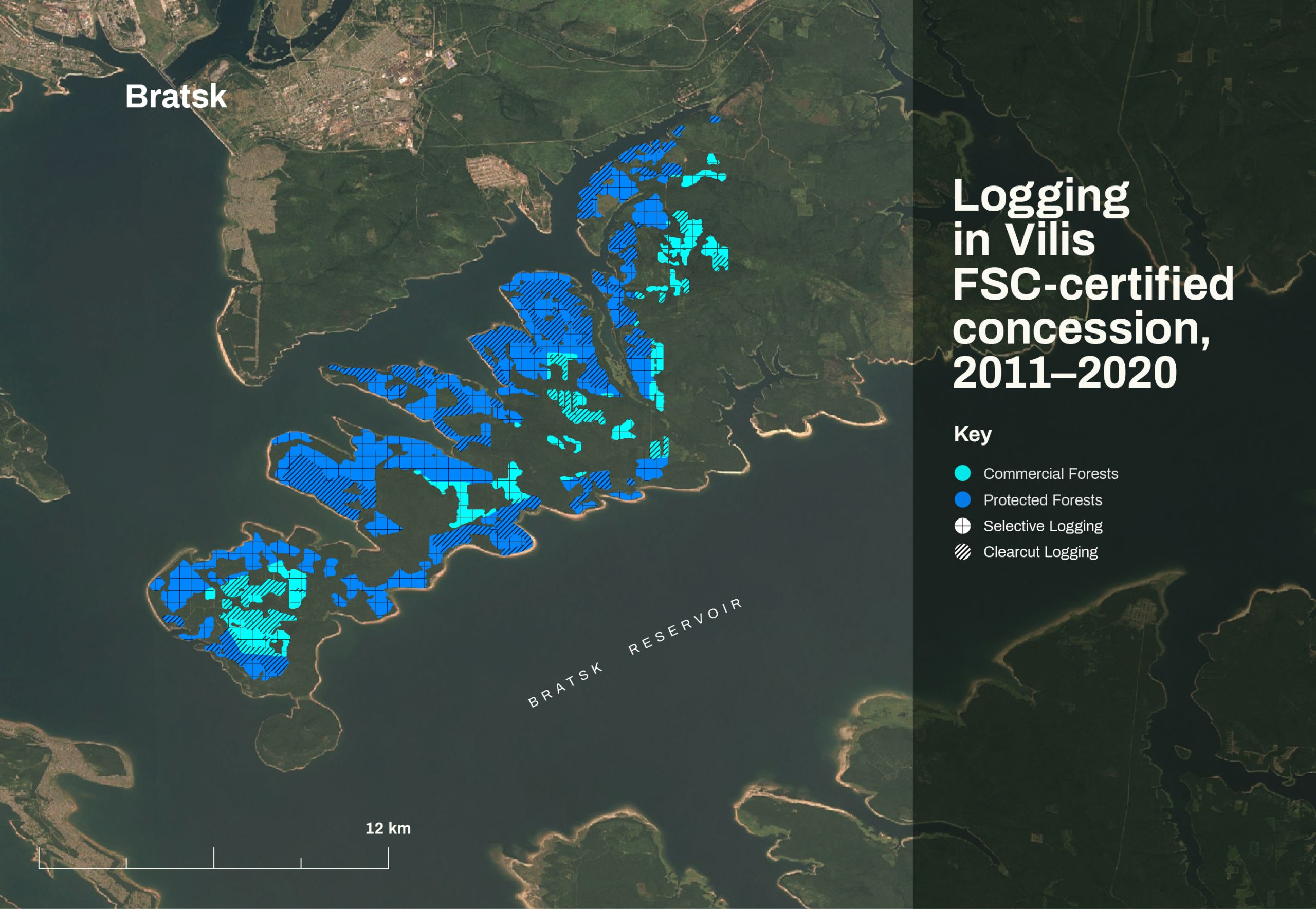
Logging in protected and commercial forests within one of Bakurov's FSC-certified Vilis concessions, lease 7-09, near Bratsk, Russian Siberia, 2011-2020 © Dirk Wright for Earthsight
Logging in protected and commercial forests within one of Bakurov's FSC-certified Vilis concessions, lease 7-09, near Bratsk, Russian Siberia, 2011-2020 © Dirk Wright for Earthsight
Zyaba bay, July 2017
Zyaba bay, May 2020
Soldatskiy bay, September 2018
Soldatskiy bay, May 2020
One reason they were clearing forest along these fragile shorelines illegally was as a cheap means of transporting their logs out of the forest. Rather than transport the logs by the established logging roads as required by law, which was difficult and expensive, particularly during the muddy summer months, Bakurov's firms made systematic use of the neighbouring rivers and reservoir instead. Miles of precious shoreline was ripped apart by heavy machinery, as tens of thousands of logs were violently dragged across it to waiting barges.
Bakurov's firms were caught red-handed in such illegality multiple times. On three separate occasions during 2018-2019, Bratsk environmental prosecutors took logging firms operating under contract in Bakurov's leases to court for such breaches. The records show that field inspections by the authorities revealed numerous cases where shorelines had been torn up, littered with logging debris and polluted with engine oil.

Satellite images taken from 2016 to 2019 show a protected shoreline within Vilis forest lease 7-09 used to store logs and load them onto barges at Zmeiniy Bay, in Irkutsk Oblast, Russia. Satellite imagery: Maxar Technologies / CNES / Airbus / Google Earth
Satellite images taken from 2016 to 2019 show a protected shoreline within Vilis forest lease 7-09 used to store logs and load them onto barges at Zmeiniy Bay, in Irkutsk Oblast, Russia. Satellite imagery: Maxar Technologies / CNES / Airbus / Google Earth
Wasteland
Squinting at satellite photos taken from hundreds of miles above the earth wasn't enough. In September 2020 Earthsight visited logging sites within protected forests controlled by Bakurov's companies to witness the destruction for ourselves. We travelled to six sites in Irkutsk's Bratsk and Ust-Udinskiy districts, unearthing yet more violations of environmental and logging laws.
We saw no signs of sickness or pests on stumps that survived sanitary clear-cutting. Nor were neighbouring forest stands visibly weak, dead or dying. In fact, valuable conifers had been chopped down while cheaper species were left untouched. Dead trees which should be priorities for felling and removal during real sanitary logging had also been left standing.
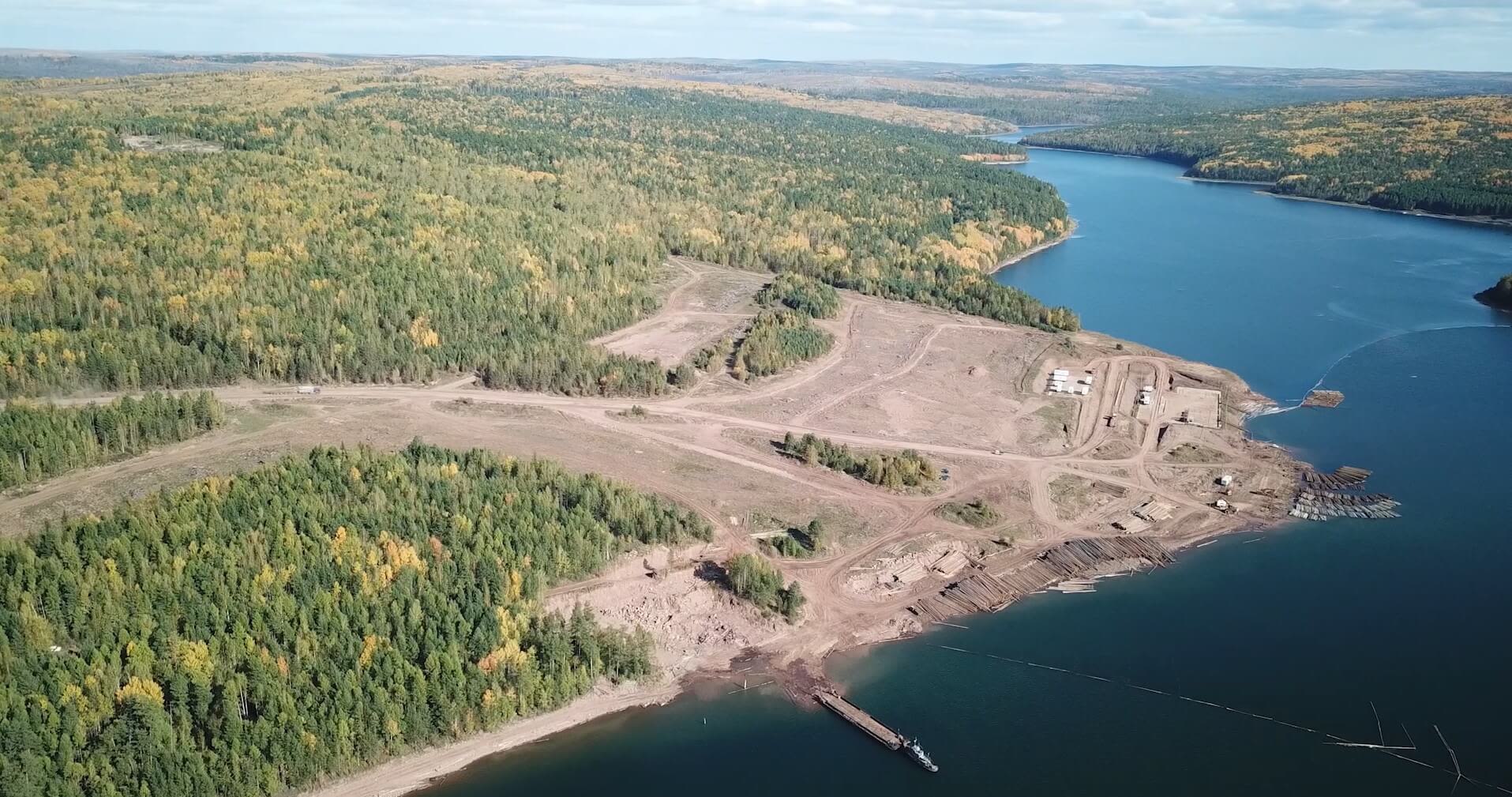
Log loading bay in Irkutsk Oblast, Russia © Earthsight
Log loading bay in Irkutsk Oblast, Russia © Earthsight
Visiting sites of illegal deforestation along the shores of Bratsk reservoir, we found them strewn with equipment, machinery and vehicles. Vehicle tracks and log piles littered the scene. Along the reservoir, man-made embankments served as temporary berths for loading wood onto barges and the loggers had even set up a parking lot. In one illegal clearance almost a kilometre long along the shore of the lake, we found it pockmarked along its length with channels cutting up to three metres deep into the fragile soil down which logs had been dragged.
In logging site after logging site, we found the ground littered with dead logging residues such as discarded branches and destroyed undergrowth. Illegal abandonment of such residues in the manner seen leads to much greater fire risk. If the forest concerned had indeed been infested with pests and disease as claimed, such illegal behaviour by loggers also promotes further spread and undermines the very purpose of the harvesting.
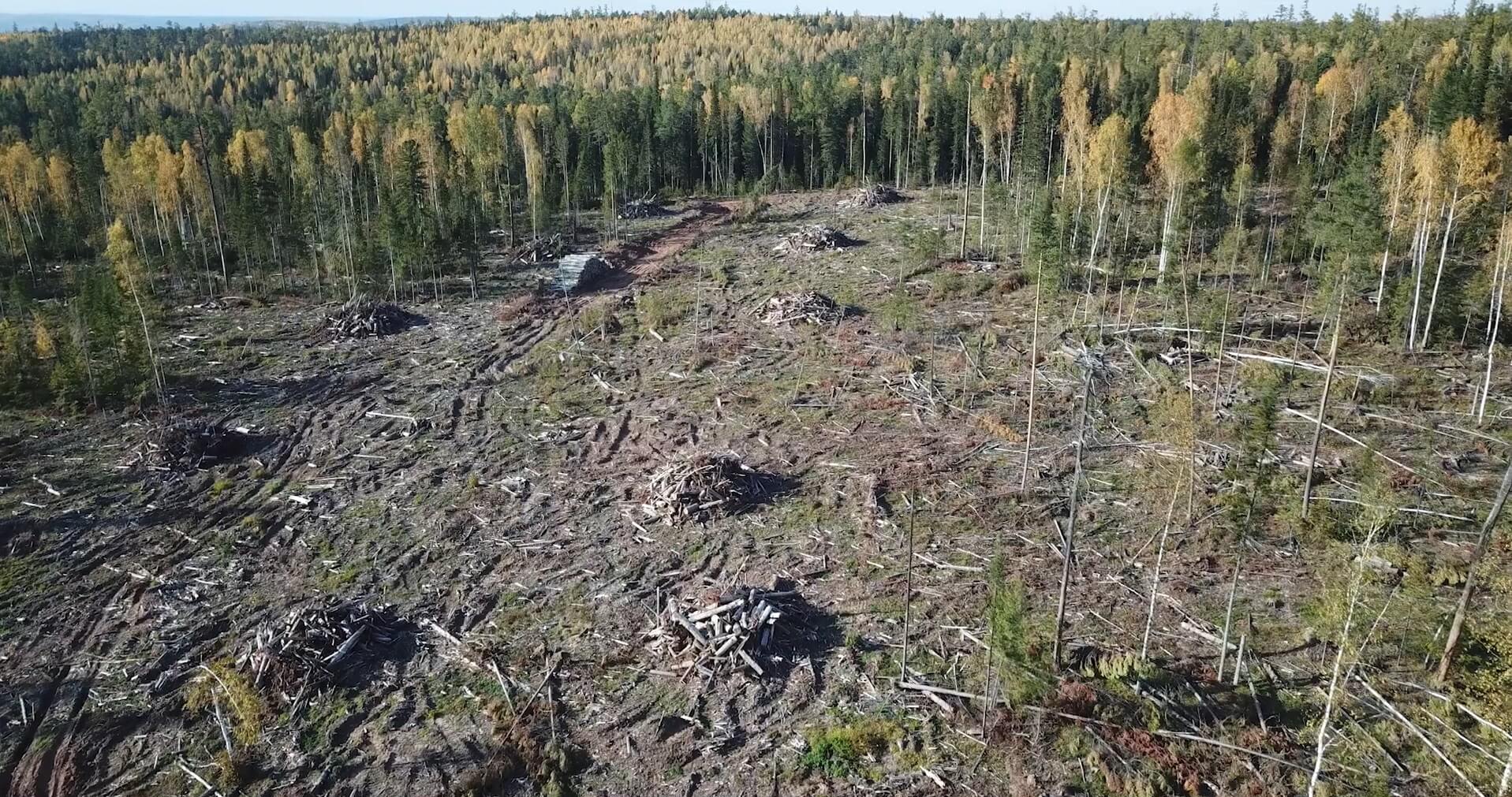
Logging site in Irkutsk Oblast, Russia © Earthsight
Logging site in Irkutsk Oblast, Russia © Earthsight
Earthsight's field visits also confirm that the companies Bakurov controls are systematically failing in their legal obligations to help forests grow back once loggers have left. Such 'reforestation' activities are commonly cited by Bakurov publicly as evidence that his activities don't harm the forest or wildlife in the long-term. Though sometimes seen as relative technicalities, they are a crucial part of the wider logic which the forestry sector uses to justify logging and paint it as environmentally friendly.
Yet arbitration court files contain evidence of his firms skipping some of their required reforestation duties, trying to avoid them and, in some cases, falsely stating that they had performed them. Bakurov's firms have been repeatedly fined as a result. In one case in 2017, to the tune of 5 million roubles ($84,000). Our field checks suggest that these cases are the tip of the iceberg, with failures of this kind standard practice in forests under Bakurov's control.
New friends, new tricks
One likely reason that Bakurov was able to stay ahead of the authorities longer is his powerful political and government connections. But by 2019, his allies were starting to suffer the consequences of colluding with businessmen such as him, and his position was beginning to look increasingly precarious.
First came the downfall of the Irkutsk forest minister Sergey Sheverda in early June 2019, for his role in illegally approving sanitary felling of healthy forest in a nature reserve. Prominent regional political observers immediately and publicly raised Bakurov's name in relation to the case, and local press reports also alleged the involvement of his firms, though Earthsight could find no evidence to support this.
Less than a month later, his boss was also in trouble, again with a forest-related connection. Floods hit Irkutsk in late June and early July, displacing tens of thousands, killing at least 18 people and hitting the headlines nationwide. Local press reports alleged that the illegal logging of coastal protection zones – including by Bakurov – had contributed to the devastation. Greenpeace Russia's forest chief agreed that suspect 'pseudo-sanitary' felling had likely contributed.
The response brought the region to the attention of the Kremlin. Irkutsk's top official, Governor Sergey Levchenko – a key Bakurov ally – came under growing criticism for his poor response to the disaster, and in December 2019 was finally sacked.
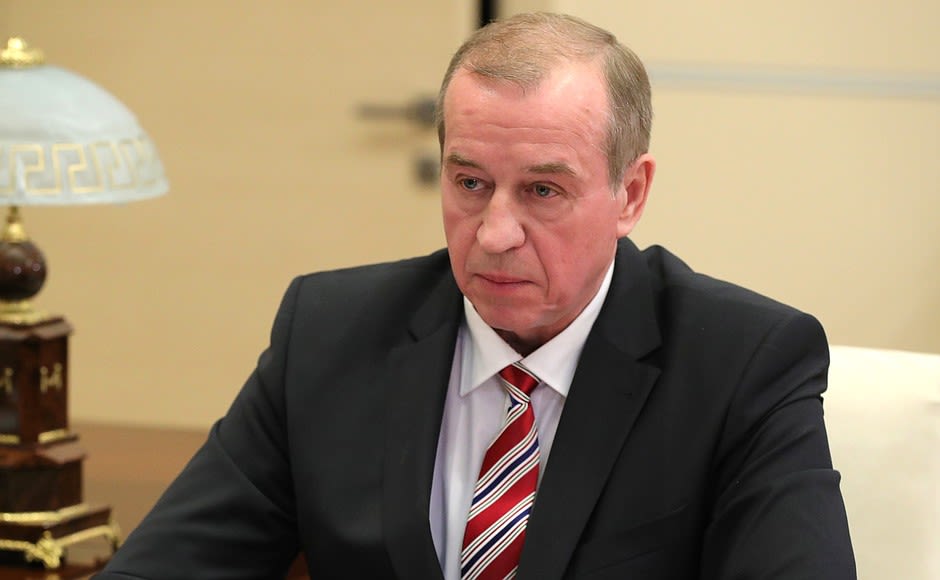
Sergey Levchenko. Photo: Office of the Russian President
Sergey Levchenko. Photo: Office of the Russian President
With his key allies out of office and illegal sanitary logging in the state garnering unprecedented attention among the public and even as far as Moscow, the net began closing in on Evgeny Bakurov. The flow of dodgy lease amendments stopped and within a year of the floods and Sheverda's downfall logging was finally brought to a halt by the courts in seven of Bakurov's eight remaining illegal amendments. The last one was finally halted, two years too late, in February 2021. Earthsight's satellite eye-in-the-sky confirmed that the party appeared to be over.
A lesser man might have taken defeat gracefully. After all, though officials had been arrested, sacked or jailed, Bakurov and his companies had pocketed millions and suffered little more than the odd minor fine. He could have rested on his laurels, sat back and enjoyed his new-found wealth. But that would be to underestimate Evgeny Bakurov. Instead, he was quick to cultivate new friends and invent new tricks.
When his long-term ally Levchenko was sacked by Putin in December 2019, Bakurov moved quickly to befriend his replacement. When acting Governor Igor Kobzev looked to confirm his position in the legislative elections of September 2020, timber companies owned or closely linked to Bakurov were among the most generous contributors to his campaign. Records show they supplied 12 million roubles ($160,000), 10 per cent of the total funds raised.
As well as a new ally, Bakurov also has a new trick. With the sanitary logging scam providing an increasingly difficult route to riches, Russia's illegal timber barons have hit on a new scheme: Priority Investment Projects (PIPs).
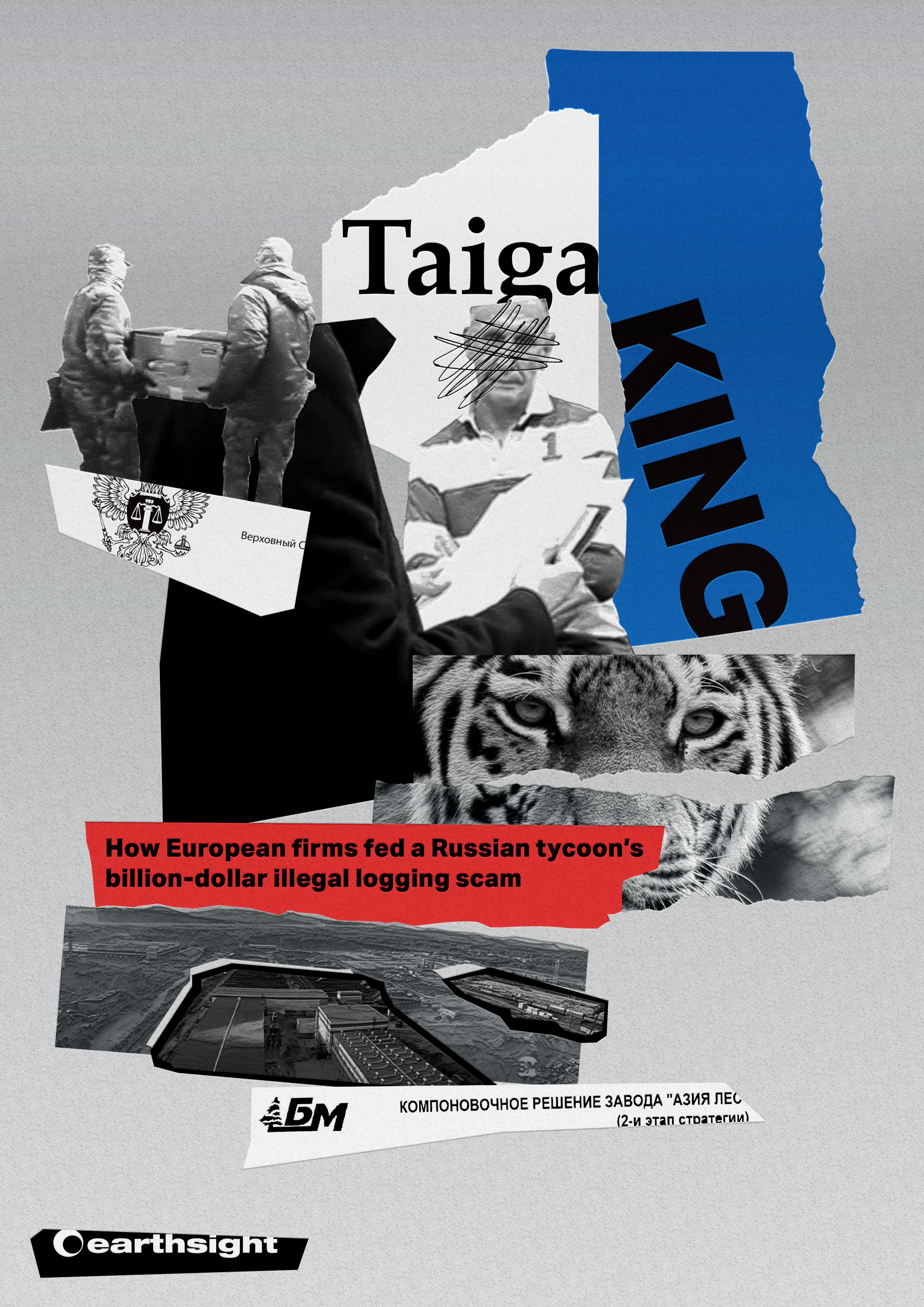
Earthsight report Taiga King © Earthsight
Earthsight report Taiga King © Earthsight
The PIP scheme was designed to promote downstream processing in the Russian wood industry but has evolved into a scam which logging companies illegally abuse to gain cheap access to forests and benefit from state subsidies. One such project was at the heart of Russia's largest illegal timber scandal this century, which occurred in Khabarovsk in the Russian Far East. As Earthsight documented in an explosive report, in 2019 Russia's domestic spy agency blew the lid on the case, arresting the timber baron involved. Prosecutors alleged that his company wood processing facility was a sham, used to cover the illegal harvesting of some 600,000 cubic metres of logs. The man in charge of Khabarovsk's forest industry during the height of the scam was found guilty of abuse of office in 2020 as a result. The timber baron behind the scam also admitted paying bribes to a federal official in Moscow.
In response to the scandal, Russian president Vladimir Putin ordered his government to strengthen state oversight of priority projects. But with key decisions remaining in the gift of local officials, the opportunity for graft remained.
In December 2020, two months after his successful election, one such official, Irkutsk governor Kobzev, announced three new forest-related Priority Investment Projects for his region. One of those projects, it later emerged, has been given to Bakurov-owned timber firm Angri LLC, one of those generous political donors. The project will bring with it the rights to cut 422,300 cubic metres of timber – or approximately 700,000 trees – each and every year.
3. Connecting
to the world

Not so remote
The dense coniferous forests of Irkutsk are about as remote as it gets. To the south stretch the vast empty deserts of Mongolia. To the north, an unbroken expanse of wilderness touches the frozen Arctic. From Bratsk, the nearest open water port is more than 1,600 miles away; Moscow another 800 miles, across a mountain range and five time zones.
It is not a place you would expect to be well-connected to the outside world. And on the face of it, for Bakurov's little timber empire, this would appear to be true. His companies process few of the trees they cut. Most are sold to local wood product manufacturers. The exports he does have are to nearby China.
"The first clue came from Bakurov himself"
Yet ours is a globalised world, and the tentacles of big business reach even its remotest corners. As it turns out, there are threads connecting Bakurov's business to every part of the planet – and to one of its biggest corporate names.
The first big clue to how to trace these threads came from Bakurov himself. A promotional video for his firms published on YouTube in 2016 shows him brag of supplying none other than the largest wood product retailer in the world: Ikea. He said the multibillion-dollar brand had initiated the relationship some years earlier, and claimed the Swedish giant was particularly pleased with his ability to deliver the goods. "After seven years of Ikea's work in Russia with logging companies," Bakurov claimed the retailer had told him, "we chose your company because you send logs faster than we can transfer the money."
Going undercover
In that same promo film, Bakurov claimed to supply wood to factories near the Chinese port city of Qingdao, whose main customer is Ikea. While initially the wood ending up with Ikea was leaving Russia as logs, he also claimed to have persuaded the Swedish firm to support the setting up of a sawmill in Russia to do primary processing there.
But it remained uncertain which Ikea products were concerned, and which Chinese factories were making them. It was also possible that the business relationship had since broken down, perhaps because of the court cases and media reports revealing wrongdoing by his firms. Or perhaps Bakurov was simply lying.
Earthsight investigators went undercover early this year to find out. We tried to contact the timber baron. Though he proved elusive – too busy with political campaigning to talk – we were able to speak to his deputy, Vadim Kovalevsky. Kovalevsky confirmed that Bakurov's group continued to supply Ikea, including via a local processing company called Uspekh – Russian for "success".
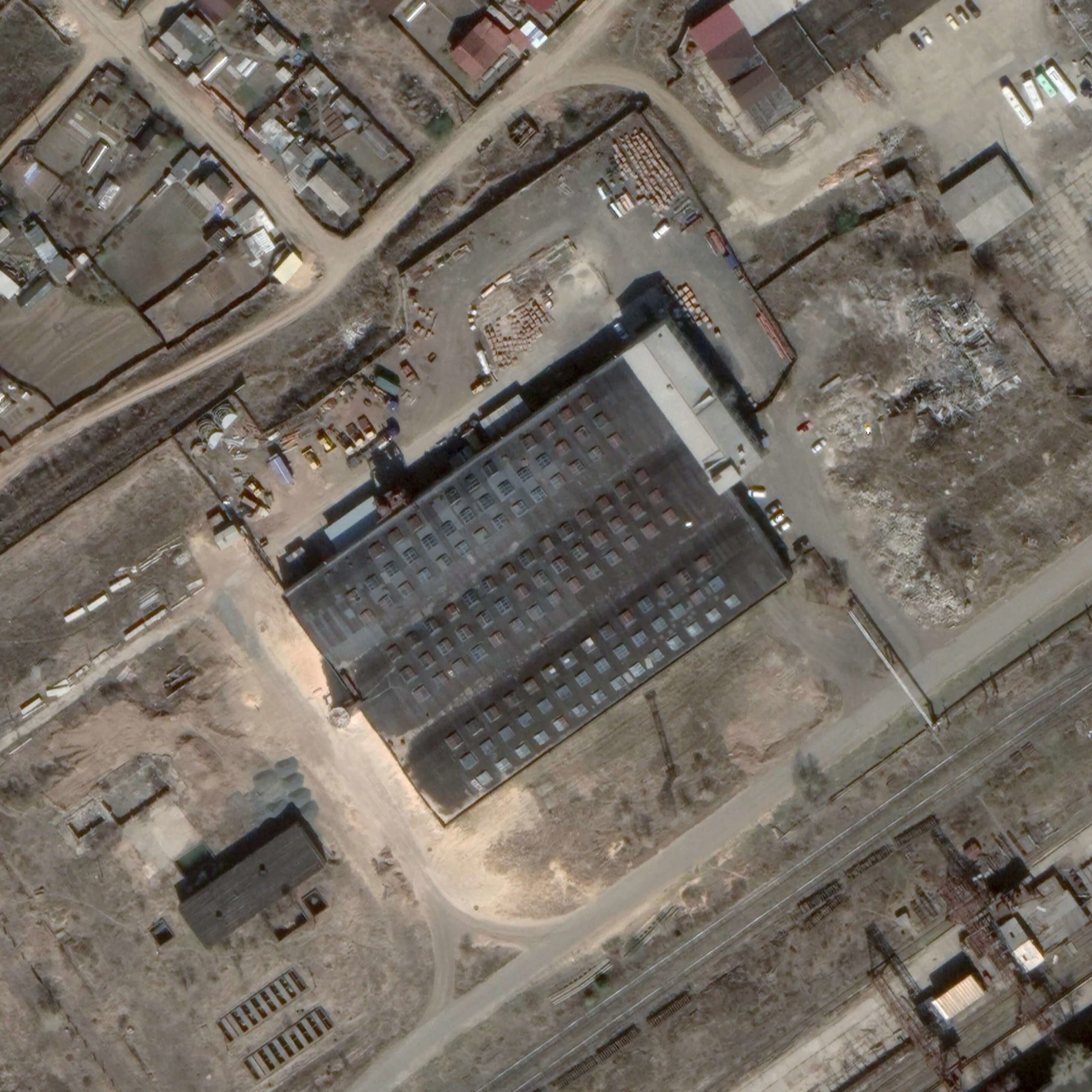
Uspekh wood processing factory in Irkutsk Oblast, Russia. Satellite image: Maxar Technologies / Google Earth
Uspekh wood processing factory in Irkutsk Oblast, Russia. Satellite image: Maxar Technologies / Google Earth
"Yes," said Bakurov's right-hand man, "we [still] have buyers who buy wood from us and then sell it in the form of finished products to Ikea."
Data from the Russian government's wood tracking system, LesEGAIS, confirmed Bakurov firm Kapel (which conducts the logging in his leases, including Vilis) as the largest supplier of raw materials to Uspekh, which is itself located right next door to Bakurov's own processing site in a town close to Bratsk. Uspekh turns the wood into small, planed pine staves, which are glued together to make boards. During the period from January 2020 to March 2021, nearly half (49 per cent) of Uspekh's raw materials came from Bakurov's forest lease-holding companies. And almost all (93 per cent) of Uspekh's supplies from companies certified by global green auditors the Forest Stewardship Council (FSC) – the only wood that Ikea accepts – came from Bakurov.
While undercover, and after an introduction from Kovalevsky, Earthsight spoke to Uspekh’s director, Anna Prelovskaya. She confirmed her company sourced from Bakurov's group and said that they had been supplying wood used in making Ikea furniture for over six years.
Prevlovskaya added that Ikea represents a significant share of the company's total turnover, which varied from 50 per cent to 70 per cent, depending on the season.
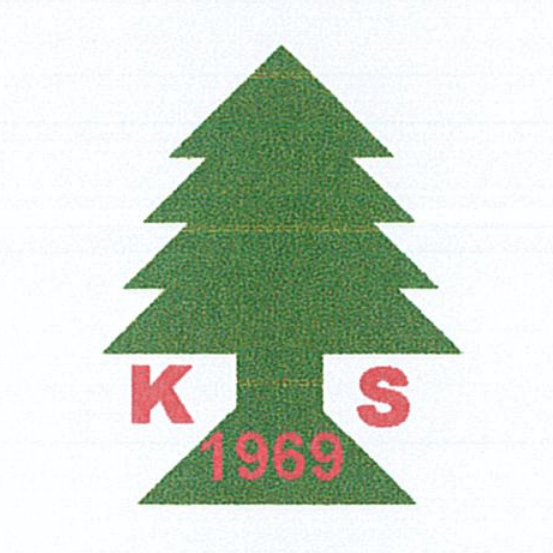
Logo of Indonesian furniture manufacturer and Ikea supplier PT Karya Sutarindo. Source: Earthsight
Logo of Indonesian furniture manufacturer and Ikea supplier PT Karya Sutarindo. Source: Earthsight
She went on to say that the Ikea manufacturers her company supplies include one based in Southeast Asia, but would not provide its name. The director also wouldn't say which specific Ikea products used her company's wood.
Fortunately, we had other means of finding this out. Customs records obtained by Earthsight show Uspekh regularly ships large volumes of pine staves and boards to an Indonesian firm called PT Karya Sutarindo. Its factory is in the town of Sukorejo, part of the furniture manufacturing hub surrounding the port of Surabaya, East Java.
At a facility nestled at the base of the active 11,000-foot volcano Mount Arjuno, workers clad in matching light-blue shirts – most of them women – have churned out furniture for one of the world's best-known brands for more than 15 years, we learnt.
Though nominally independent like most Ikea suppliers, Sutarindo depends almost entirely on the Swedish furniture giant for its business. Ikea was responsible for 96 per cent of the company's sales in 2019.
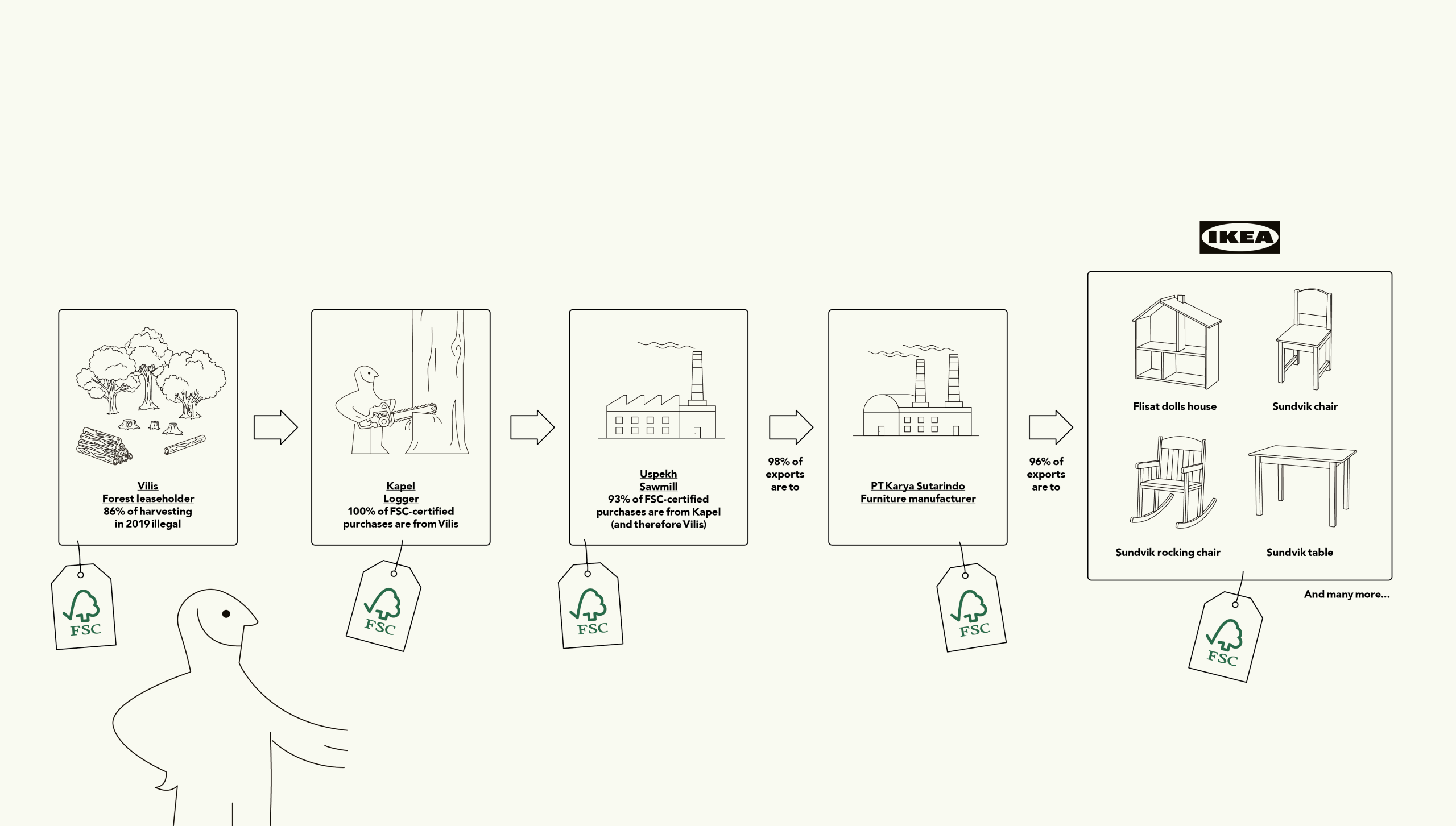
Just one of the ways illegal wood from Bakurov's Vilis lease made its way into Ikea products © Matt Hall for Earthsight
Just one of the ways illegal wood from Bakurov's Vilis lease made its way into Ikea products © Matt Hall for Earthsight
Child's play
Sutarindo's main business is in kids' furniture – and it is a booming one.
The global market for children's furniture in 2018 was worth $29.4 billion, and is expected to grow by almost 5 per cent annually in the coming years. More than 60 per cent of this furniture is made of wood. The continued success of the children's furniture market has seen big brands signing licensing deals with top fashion designers and celebrities like Hollywood actress Drew Barrymore. The pandemic accelerated this growth, closing schools during national lockdowns and forcing parents to set up home classrooms. Industry experts note that buyers of children's furniture are also more likely to be concerned about sustainability.
Ikea's children's range accounts for between 6 and 8 per cent of its overall business in its mature markets, though this proportion can be much higher in emerging ones like India. Figures contained in Ikea's annual report suggest the company's total sales of kids' products were more than €3.2bn last year.
Though it is cheap, the brand's trendy designs draw customers from a broad range of backgrounds. Even the third in line for the British throne, seven-year-old Prince George, has Ikea furniture in his bedroom. During a tour of an Ikea store in Stockholm in 2018, his parents, the Duke and Duchess of Cambridge, better known as William and Kate, revealed they had bought such furniture for his sister too.

Many of the items in this Ikea display are made by the Indonesian firm which is using Bakurov's wood © Earthsight
Many of the items in this Ikea display are made by the Indonesian firm which is using Bakurov's wood © Earthsight
Last year, Sutarindo supplied more than 2.2 million items of children's furniture to Ikea with a retail value of $60 million, Indonesian records obtained by Earthsight show. That's equivalent to 2 per cent of Ikea's total revenues that year. The goods included best-selling products like the discount Latt table and chair set and most of the items in the Sundvik children's range – chairs, tables, beds and wardrobes, among others.
The records also reveal the Indonesian company ships to Ikea stores in countries worldwide, including the United States, China, Russia, Japan, Germany, France, Italy, the United Kingdom, Spain, Belgium and Canada. Of these sales, 45 per cent were destined for the European Union, and another fifth for the US.
Pine, the main material in these products, does not grow in Indonesia. Sutarindo must instead import it from overseas.
Digging further, Earthsight discovered that the Russian processing company closely linked to Bakurov, Uspekh, is one of Sutarindo's largest suppliers of pine. Nearly a quarter, by value, of the pine the Indonesian firm imports to make Ikea furniture comes from Uspekh, which sends it about 200 tonnes of pine staves each month. Packed into cargo containers, the goods trundle along the Trans-Siberian Railway to Vladivostok in the Russian Far East, from where they are shipped.
Roughly 1,700 Russian trees, nearly all of them supplied by Bakurov and many illegally logged, flood into this Indonesian Ikea factory each month. By a conservative estimate, one Ikea product containing this wood is sold somewhere on earth every two minutes.
Responding to our allegations just prior to publication, PT Karya Sutarindo told Earthsight that it does not use wood "from the region you speculated" (i.e. Russia) for two specific Ikea products (the Latt table and Mala easel), but pointedly did not deny using Russian wood from Bakurov's company for other products which they supply to the Swedish giant. They went on to say that they were investigating our allegations and "continue to insist on procuring legally sourced wood".

Flisat doll's house and wall shelf, one of the products made by Indonesian furniture maker PT Karya Sutarindo, on sale in an Ikea store in the UK, May 2021 © Earthsight
Flisat doll's house and wall shelf, one of the products made by Indonesian furniture maker PT Karya Sutarindo, on sale in an Ikea store in the UK, May 2021 © Earthsight
All roads lead to Ikea
While the clearest route by which Bakurov's dirty wood reaches Ikea stores is via the children's furniture made by PT Karya Sutarindo in Indonesia, it is not the only one.
Bakurov's firms continue to ship large volumes of logs and lumber certified by the Forest Stewardship Council to China, home to some of Ikea's largest suppliers. Those suppliers remain heavily dependent on the steady flow of FSC certified wood from Russia. And when he spoke to us, Bakurov's deputy Vadim Kovalevsky said he believed this wood was still being used to make Ikea goods in China (although he didn't know the names of the factories doing this). During discussions with undercover Earthsight investigators, Uspekh's director also claimed to have recently sold wood to an Ikea supplier in the country but refused to give its name.
Bakurov has previously mentioned Ikea suppliers in the Qingdao area of the province of Shandong using his wood. If so, this was likely done through a handful of large Ikea suppliers clustered in the small district of Zhucheng, well-known locally as the 'home of woodenware'. At least five big Ikea suppliers crammed cheek-by-jowl around one village, Shiqiaozi, together churn out upwards of 10 million items of furniture and other wood products for Ikea every year. Like their Indonesian counterpart, they are technically independent but utterly reliant on the Swedish cash cow.
Wang Shiliang, export manager of one of the largest of these firms, a company called Song Yuan, says the entirety of its $57 million in annual sales goes to the furniture giant. Ikea places the factories under huge pressure to deliver rapidly increasing volumes at bargain prices. Executives confess that Ikea's power exerts a stranglehold over them, forcing them to be obedient to its demands and cut costs. Otherwise, they worry, Ikea could easily drop them, leading to inevitable bankruptcy.
"Suppliers remain heavily dependent on the steady flow of FSC certified wood from Russia"
Wang and his boss explained to a Chinese journalist in 2019 that the biggest problem they face in delivering on Ikea's demands is their supply of raw materials from Russia. The imports account for more than half of the cost of the finished products they make, and with the difficulty of transporting logs and lumber from Siberia and the Russian Far East shortages of supplies are common. To get around the issues, many of these Ikea suppliers have made their own investments in Russia, including in Irkutsk province. Song Yuan alone has invested $30 million in the country and claims to control 260,000 hectares of forest.
These Chinese firms sell a wide range of products made from Russian wood – mostly pine, but also birch – to Ikea, including step stools, wine racks and wooden bowls. Many likely contain Bakurov's tainted timber.
A third route into Ikea runs through Russia itself. Both the director of Uspekh and Bakurov's deputy claimed to directly supply or have supplied Ikea's own factories in the country. Uspekh's director said her firm sold wood to them until early last year, when Covid-19 interrupted business.
Ikea has three sawmills in Russia, churning out furniture and furniture parts. The largest, at Novgorod, uses only chipboard, but its mill at Vyatka uses solid pine to make popular items such as Neiden bedframes and Lerhamn tables. Records show the products are shipped to countries including the USA, UK, Germany and France.
Tainted trade
Ikea is by no means the only buyer of Bakurov's dodgy wood in Europe or the United States. Sutarindo, we learned, also ships children's furniture to two of Ikea's biggest competitors in the United States. Though in response to our finding the Indonesian company insisted that none of these exports were made with their Russian pine, if true it appears this was more by chance than by design.
And while Bakurov's companies don't ship to Europe directly, they supply several large local mills which do. Trawling through the data, we established that in total, European firms import at least €170 million a year in wood products tainted with illegal logs from Bakurov's operations. His suspect goods contaminate a large proportion – perhaps even a majority – of eastern Russia's exports to the continent.
4. Laundering machine
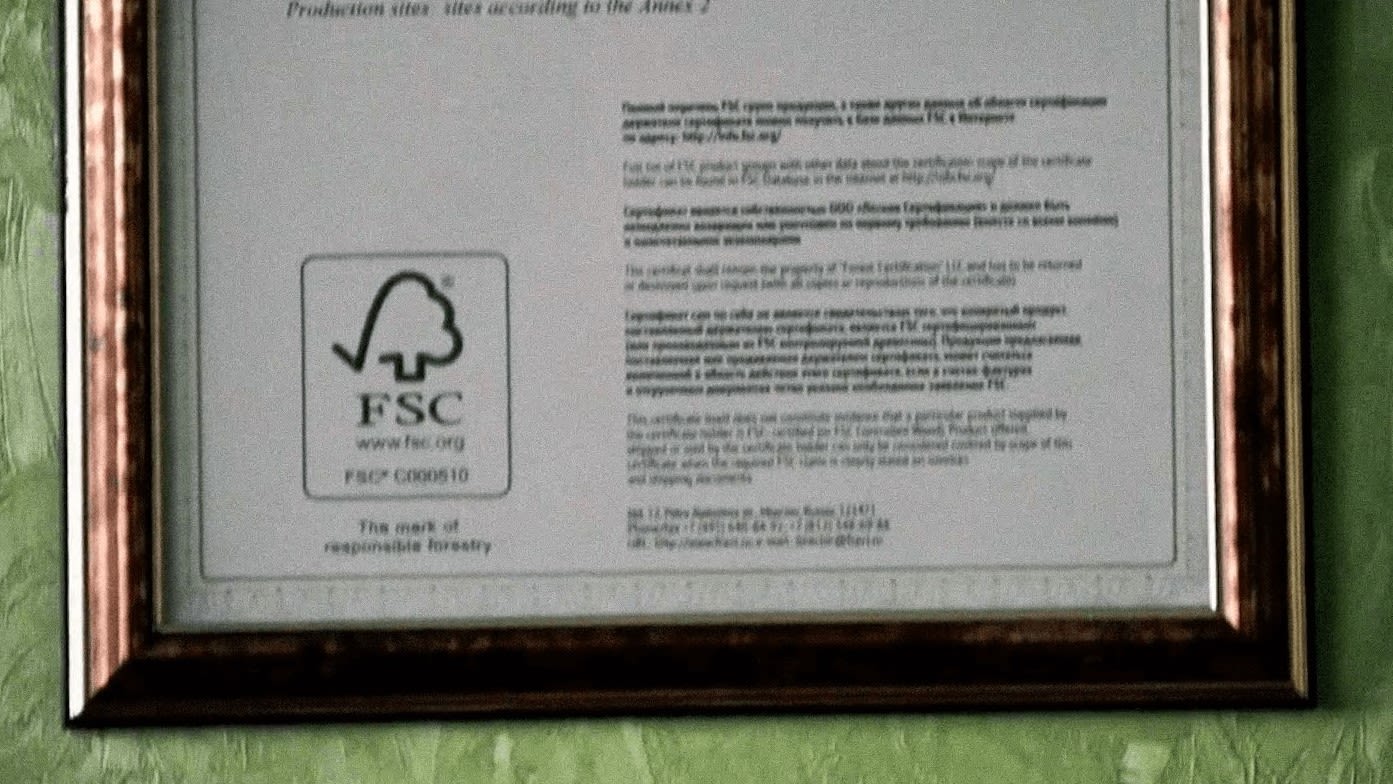
Tip of the iceberg
Earthsight's findings represent just the tip of the iceberg with respect to the presence of illegal Russian wood in both Europe and Ikea.
Ikea's consumption of Russian wood has skyrocketed in recent years. The firm used 1.9 million cubic metres of Russian logs in 2019, almost double that of five years earlier. The staggering volume represents at least a million felled trees.
Russia is Ikea's second-largest source of wood after Poland. Its forests represent a growing share of the company's supplies with stocks from elsewhere already maxed out. In 2014, 6.5 per cent of Ikea's wood came from Russia. By 2019 the proportion had risen to 9 per cent.
Ikea even has its own forests in Russia. But these supply only 7 per cent of its Russian wood needs. The rest comes from a raft of third-party suppliers, of whom Bakurov is just one.
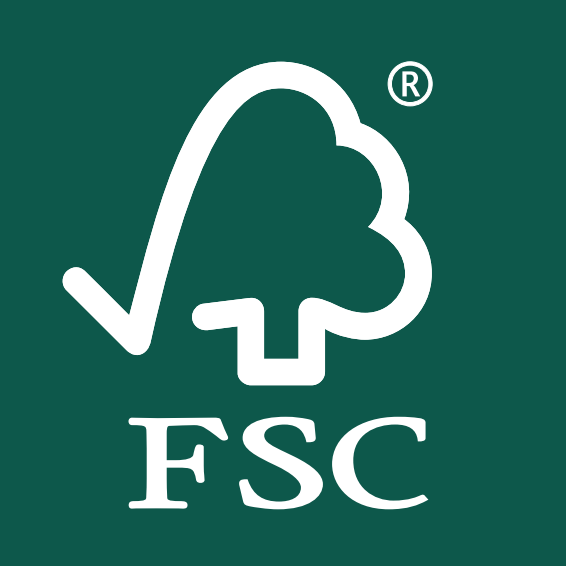
FSC logo. Source: FSC
FSC logo. Source: FSC
To ensure this wood is legitimate, Ikea relies heavily on the Forest Stewardship Council (FSC) certification scheme. Founded in the early 1990s by a group of environmental charities and progressive timber firms, FSC has grown into a behemoth. Its auditors visit and check 2.3 million square kilometres of forest worldwide each year (an area one quarter the size of the United States), supposedly ensuring that logging there is both legal and kind to people and wildlife. FSC's cuddly green tree-tick logo adorns thousands of everyday products, from tissue paper to furniture, books and even clothes made from viscose pulp.
Though it was originally meant to be a tool for environmentally conscientious consumers to ensure that they weren't contributing to global deforestation, FSC’s label has increasingly become a must-have for companies wanting to stay within the law or sell to governments and other big buyers. Some forest countries have made certification from FSC or its equivalent compulsory for loggers and timber traders, while many of the biggest international markets for wood, including the US, EU, UK, Australia and Japan, have passed legislation which makes it hard to import or sell the stuff without it.
Brothers in arms
The biggest driver of FSC's growth, however, has been Ikea. The Swedish furniture retailer was among the organisation's founders and is by far the largest consumer of wood carrying its label. Ikea committed a decade ago to source all its fresh wood from FSC-certified forests, a target it achieved last year. The brand almost failed to meet its goal – and would have done so were it not for Russia.
Almost entirely due to demand from Ikea, the area of FSC-certified forest in Russia has grown dramatically. With growth elsewhere flatlining, business from Russia has been the principal driver behind FSC's aggressive worldwide expansion.
In the five years to 2019, Russia represented 62 per cent of net global growth in FSC's certified forest area. Most of the remaining growth came from neighbouring Ukraine and Belarus, which are plagued by similar problems. Ikea's demand for wood from Russia has risen in lockstep with the area of FSC forest in the country.
Ikea's growing Russian wood consumption has driven a rapid increase in FSC-certified forest in the country.
An area of Russian forest the size of France is now FSC certified – equivalent to 14 per cent of its production forest (woodland in which logging is allowed).
Of this area, 30 per cent is in Siberia or the Russian Far East. And the largest expanse of certified forest within this region by far? Irkutsk province. Woodlands under the FSC banner in the remote territory include parts of the Bakurov empire where Earthsight documented rampant lawbreaking.
Ikea's support for FSC in Russia should have been a good thing. The vast country was well known for poor forest governance, with illegal and unsustainable logging the norm. By bringing in third-party auditors and ending the reliance on governments to police logging, FSC was supposed to improve things. In some ways it has. But fundamental flaws in how it works have led it astray.
Alexey Yaroshenko from Greenpeace Russia is well aware of FSC's flaws. He told Earthsight that voluntary forest certification schemes are unable to protect precious forests or guarantee that accredited wood products are made from legal and sustainable materials.
"We appreciate the striving of our colleagues from the FSC to make Russian forestry and forest exploitation more responsible and legal," he added, "but we understand that so far this has not been very successful."
FSC's failures would prove costly in the Bakurov saga, particularly for Ikea.
Elephant in the room
When auditors visit a logging company to assess its activities against the FSC criteria, they are required to publish a summary of their findings. This transparency is intended to ensure that anyone can see what the auditors found and how they came to their decision. Often, the most revealing details of what is really happening in a forest come not in the form of what these reports say, but what they miss out.
Over time, such reports can run into hundreds of pages. With language largely impenetrable to all but a select few, they include microscopic details on trivial matters. Yet all too often they also manage to omit – or perhaps deliberately obscure – hugely important facts. In one forest in Ukraine, for example, audit reports obsessed over the type of trousers loggers were wearing – while neglecting to mention the rampant lawbreaking the environmental police had exposed there.
The proverbial elephant in the room in the Bakurov case was far larger. This is because, shockingly, some two-fifths of the forests where Bakurov's companies have been engaged in wanton destruction in recent years have had the FSC imprimatur that whole time. After more than 10 years of checks, the published reports run to a combined 234 pages. The auditors found time to record how many ambulances the local hospital has, along with a single case of a fuel storage tank being put in the wrong place. But, somehow, they failed to notice an illegal timber grab of quite startling dimensions happening right in front of their eyes.
"Auditors failed to notice an illegal timber grab of quite startling dimensions"
The logging in 95,000 hectares of forest leased to Bakurov's Vilis LLC was first certified in December 2010 by Forest Certification LLC, Russia's home-grown FSC-accredited auditing firm. Since then the company's auditors have been back no fewer than 13 times. What they missed confounds belief.
All the illegal acts described in Chapter 2: 'The heist' were detected by Russian authorities or Earthsight in Bakurov's FSC-certified Vilis concession, as well as in other Bakurov forest leases. The charge sheet is stark: court decisions have ruled that amendments to three of the five FSC-certified Vilis leases were illegal; field evidence confirms the unjustified and illegal nature of this sanitary logging by showing that the forest concerned was healthy; in one of the FSC-certified leases, satellite images show illegal logging continued even after the courts invalidated the lease amendment concerned; the illegal sanitary clearcuts within the Vilis concessions included some of the largest areas within the wider Bakurov estate in protective zones along the edges of lakes and rivers, areas especially important for the spawning of fish and prevention of erosion and pollution of water sources; in 2019, 86 per cent of all timber cut within the Vilis concession certified by FSC came from illegal sanitary harvesting in protected forests; and more than 40 per cent of trees illegally harvested in protected forests across the Bakurov empire over the last decade were cut in Vilis's certified land leases.
A large proportion of the illegal felling in nominally 'protected' forests within Bakurov's forests took place in his FSC-certified concession
In short: there have been publicly available indications of wrongdoing by Bakurov's companies, including within the FSC-certified Vilis concession, for years. FSC auditors reported none of this information. Instead, the lease amendments which vastly increased the scale of felling in the concession went unremarked on. Auditors also made no mention of the controversy regarding the legality of these lease amendments, despite the allegations by local prosecutors having been a matter of public record since September 2014 for Bakurov's wider group and October 2018 for Vilis in particular, and court decisions relating to these allegations being a matter of public record since December 2014 for Bakurov's wider group and in April 2019 for Vilis in particular.
The scandal regarding this illegal sanitary logging by Bakurov's companies, including Vilis, has also been repeatedly mentioned in the local press since 2015. Yet once again FSC auditors did not mention this in their annual inspection reports.
Nothing to see here
So how did auditors seem to miss such obvious illegal logging and environmental crimes? Were they asleep, hoodwinked or simply incompetent? At best, the case indicates wilful blindness on their part.
Despite glaring omissions, the summary reports show that the auditors weren't entirely in the dark. The documents suggest auditors knew that the allowable cut in the Vilis leases had dramatically increased, since they dutifully reported the revised numbers. But they didn't note or comment on the changes. The reports also reveal that auditors were aware as early as 2010 that Vilis was conducting sanitary logging in protected forests. And while auditors did not need to visit each separate part of the company's FSC-certified land leases on an inspection, the reports claim that auditors paid multiple visits to the two leases where we know widespread sanitary felling was happening in protected forests, at the time it was happening. In every report, the auditors claim that their field checks included ones relating to the justifiability of sanitary felling. They also claim to have included visits to the boundaries of protected forest zones along the banks of water sources.
"Auditors weren't entirely in the dark"
It certainly seems implausible that forestry professionals could be ignorant of Russia's problem of illegal sanitary logging, or the scandal surrounding it in Irkutsk, the country's biggest timber producing province. The matter was well known to all those engaged in the forest sector, be they in the remotest taiga or Moscow. It is also hard to see how the systematic breaches of regulations during harvesting, as detected by Earthsight's research, do not appear to have been spotted during the annual field checks that supposedly took place.
However, while individual failures by the Russian company doing the audits likely played a part, the certification scheme's flawed systems and procedures were at least as important in explaining this fiasco. Earthsight and others have highlighted such structural defects in previous reports relating to FSC certification in other countries, but still they remain.
Blinkers on
The problems started the moment the certification was first approved.
To avoid its brand being used to mask, or greenwash, environmental abuses and wrongdoing, FSC requires logging companies to declare all of the forests they control, not just the land they are looking to have certified. Uncertified forests are not subject to the full list of FSC's checks, but auditors are expected to carry out some basic due diligence on logging within them like ensuring it meets minimum legal standards.
Importantly, however, the rules don't require the auditors to check whether the company being certified has been honest in its declaration. They also leave some room for interpretation over which of its affiliated corporate entities need to be declared. In this case, Bakurov's logging companies DeepForest, Vertical-B and Noviy Les were never declared in FSC public summaries for Vilis despite all four firms being owned by the same man. As a result, auditors were under no obligation to monitor whether they were engaged in criminal activity, despite plentiful clues that they formed part of a larger whole.
It was for this reason that auditors did not notice – or could ignore – the scandals involving Bakurov's uncertified firms long before they spread to Vilis. One of the most damning examples of confirmed illegal, unjustified sanitary felling in protected forests considered in this report involved Bakurov outfit DeepForest, in which a forest official was jailed for falsifying documents claiming trees in one of the company's forest lease were diseased. Local press reports also alleged the involvement of Bakurov's wider group with the illegal sanitary logging in Tukolon Wildlife Refuge which resulted in the arrest of the provincial forest minister (Earthsight was not able to substantiate these claims). The FSC reports mention none of this.
Timber laundering
The lawbreaking taking place in the parts of Evgeny Bakurov's forest estate that are not certified are potentially more important to this story than they might first appear. And again, the fault lies with FSC's core systems.
Ensuring illegal wood is not laundered through certified supply chains is a crucial function for forest certification schemes. Unfortunately, a series of scandals shows FSC is failing to stem the flow of dirty timber despite a growing arsenal of technologies now available to detect it.
"The fault lies with FSC's core systems"
FSC's 'chain-of-custody' system is entirely paper-based, and predicated on a level of trust in logging and timber processing companies which has been shown time and again to be undeserved. Companies merely have to show they have the necessary safeguards in place to keep certified and uncertified wood separate, and not that they actually use them. FSC's proposed 'Online Claims Platform' could have eliminated the problem of uncertified wood slipping into certified supply chains by ensuring only as much FSC wood was sold as was harvested. But the certification scheme abandoned the plan after pressure from timber industry members.
Earthsight's research suggests uncertified timber from Bakurov's forest estate was very likely laundered into FSC supply chains. Earthsight's estimate of logging activity in Vilis leases in the period 2014-2019, drawn from remote-sensing data, indicates the company reported in its official declarations that a much larger area of forest was cut down each year than was actually the case. Nearly 9,400 hectares of forest was declared to FSC as having been logged over the period – an area 48 per cent larger than the remote-sensing data's estimate of 6,300 hectares.
Earthsight's assessment of satellite imagery of Bakurov's FSC certified forests revealed much less logging than his company claimed, suggesting harvest volumes could have been exaggerated to allow non-FSC wood to be laundered from elsewhere.
The discrepancy means that 535,000 cubic metres of wood, a volume six times as big as London's Royal Albert Hall and representing a third (35 per cent) of the 1,539,057 cubic metres Vilis declared to have harvested over the period (excluding wood obtained through thinning), could not be accounted for by the observed activities.
Earthsight's assessment of satellite imagery of Bakurov's FSC certified forests revealed much less logging than his company claimed, suggesting harvest volumes could have been exaggerated to allow non-FSC wood to be laundered from elsewhere.
Though a methodology of this kind is necessarily open to some small level of error, this cannot explain such a huge discrepancy. This is supported by the fact that an identical analysis by Earthsight of a nearby non-Bakurov lease produced an estimate of harvest area within 6 per cent of that which had been reported.
So how to explain the gap between the company's data and the satellite evidence? A likely explanation is that wood harvested elsewhere was falsely recorded as coming from Vilis forest concessions, and subsequently laundered as FSC-certified.
There could yet be other, more innocent explanations. But no-one really knows, and given Bakurov's history, it would seem unwise to give him the benefit of the doubt.
FSC does have powers to spot timber laundering and stop it from happening, but, in a classic Catch-22, will only use them if there is evidence that timber laundering is already taking place. The forest certification scheme expects NGOs to provide that evidence – but doesn't publish the data they would need to find it.
Race to the bottom
Even the failure of individual auditors and auditing firm Forest Certification to follow FSC rules in this case can arguably be placed at the green label's own door. For many years, environmentalists have highlighted a glaring flaw in how the certification scheme works. It subcontracts auditing duties to for-profit firms which are paid directly by the very companies they are meant to police. With third-party auditing bodies competing for business from logging firms, wood processors and traders, the system engages them in a so-called "race to the bottom", driving down auditing standards.
Forest Certification, the auditing firm which certified Bakurov's empire and failed to notice the rampaging elephant in the room, is a case in point. Whereas other FSC certification firms are international companies operating pretty much everywhere, Forest Certification is a Russian-owned company specialising in certifying forests in the former Soviet Union – particularly Russia and Ukraine. Over the last few years, it has carved out a niche for itself in the high-risk region.
While in 2016 the Russian firm was responsible for monitoring 10 per cent of the area of FSC certified logging in its home country, by 2019 this proportion had grown to 58 per cent. Forest Certification's services have also been particularly sought-after in Russia's most lawless regions. Though it is responsible for 41 per cent of FSC 'forest management' certificates in the European part of Russia, it has issued almost two-thirds of them in Siberia and the Russian Far East. In Irkutsk, the proportion is even higher. Of the 30 certificates active as of December last year, Forest Certification was responsible for 21 – including Bakurov-owned Vilis.

Forest Certification LLC logo. Source: Forest Certification LLC
Forest Certification LLC logo. Source: Forest Certification LLC
Forest Certification also has a growing business in Ukraine, where it is now responsible for monitoring a quarter of the total FSC certified forest area. Its reputation there isn't great. One of its first jobs was certifying a large, state-owned forestry enterprise in Polissia, in the north of Ukraine. A previous report by Earthsight, published in 2018, revealed that the enterprise was at the centre of a major ongoing criminal corruption probe, and was illegally exporting logs in the guise of "fuelwood" in volumes greater than any other state-backed forestry business in the country. Forest Certification's auditors appeared not to notice either.
FSC subsidiary Accreditation Services International (ASI), tasked with watching the watchdogs, is meant to prevent these mistakes. But its oversight of the competing certification bodies has failed to stop environmental abuses from happening right under their noses. This is because ASI only examines a small sample of FSC-accredited forests, following the same flawed procedures as the certifying bodies it is meant to police.
As it happens, ASI never felt Vilis was worthy of their attention, despite one of Forest Certification's auditors – quickly overruled by his superiors – describing the company as "high-risk". ASI did carry out a general audit of Forest Certification's headquarters in September 2020, but gave the certification body a clean bill of health. Exactly why is not clear, because the findings of the audit are kept secret.
Clean slate
In November 2020, during Vilis's five-year FSC recertification audit, the company's FSC certification was amended to remove four of its five forest leases. At the same time, the remaining lease was transferred to another Bakurov-owned company, Kalinov Most. No plausible explanation for these changes is provided by the auditors in the FSC public summary.
A possible reason for the changes is that the illegal sanitary logging which had been taking place within the forest leases for years could no longer be kept from (or ignored by) the auditors. Therefore, to retain his FSC accreditation, Bakurov removed the Vilis leases within which the illegalities had occurred from the scope of the certificate. The leases were certainly not removed because of belated action by auditors.
So why transfer the remaining lease from Vilis to Kalinov Most? This may also have been done to circumvent FSC's partial certification rules and avoid auditors having to consider what had occurred in the areas now out of scope. Kalinov Most, a separate legal entity untainted from past scandals, could claim it had no responsibility for the actions of Vilis.
With his business reputation increasingly called into question, and perhaps mindful of the possibility that FSC might one day – belatedly – catch up with him, Bakurov has also sought backup from FSC's global competitor, Programme for the Endorsement of Forest Certification (PEFC).
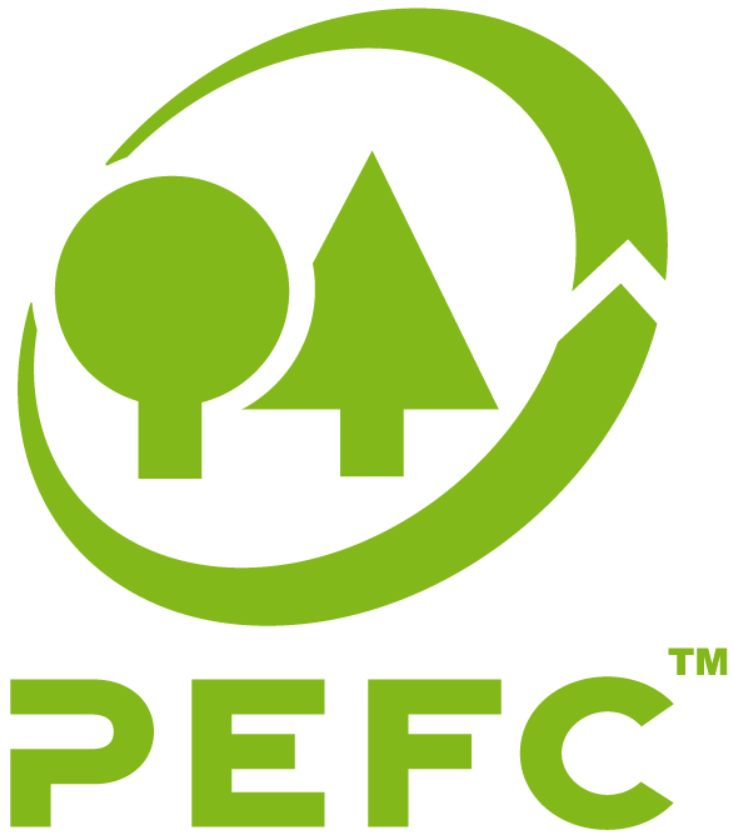
PEFC logo. Source: PEFC
PEFC logo. Source: PEFC
PEFC's reputation is worse than FSC's, and so are its standards. Though it doesn't quite have the cachet of the leading green label, and will not suffice for Ikea, its certificates are nevertheless enough for most of Europe's eco-conscious wood buyers. In December 2020, Earthsight revealed how timber linked to the largest Russian illegal logging case this century had received the PEFC stamp and flooded into Europe as a result.
PEFC certainly did no better in noticing Bakurov's illegalities. In April this year, they approved a certificate covering two of the ex-Vilis leases and a third lease held by Kalinov Most. Again, the two Vilis leases where the rampant illegal harvesting had been occurring until very recently were excluded. That the PEFC auditors didn't pick up on Bakurov's shady background perhaps isn't surprising, since they were from the same firm – Forest Certification – which had somehow failed to spot anything fishy while certifying his company for FSC for the previous 10 years.
Though the rotten leases were excluded from the scope of these certificates, this did not mean the risk of illegal wood being rubberstamped by the two green labels had disappeared. Given the evidence of laundering of uncertified wood by Bakurov's firms, their reputation for other illegalities, and the record of the auditors, that would surely have been a rather false hope.
There is also the small matter of Russia's many other FSC-certified and PEFC-certified forests to consider, all audited using the same flawed systems and many by the same local auditing firm. Similar issues are almost certainly to be found in these other forests. Indeed, we know that what has happened within Bakurov's FSC-certified forest leases is not unique, in Russia let alone the wider world.
5. Déjà vu
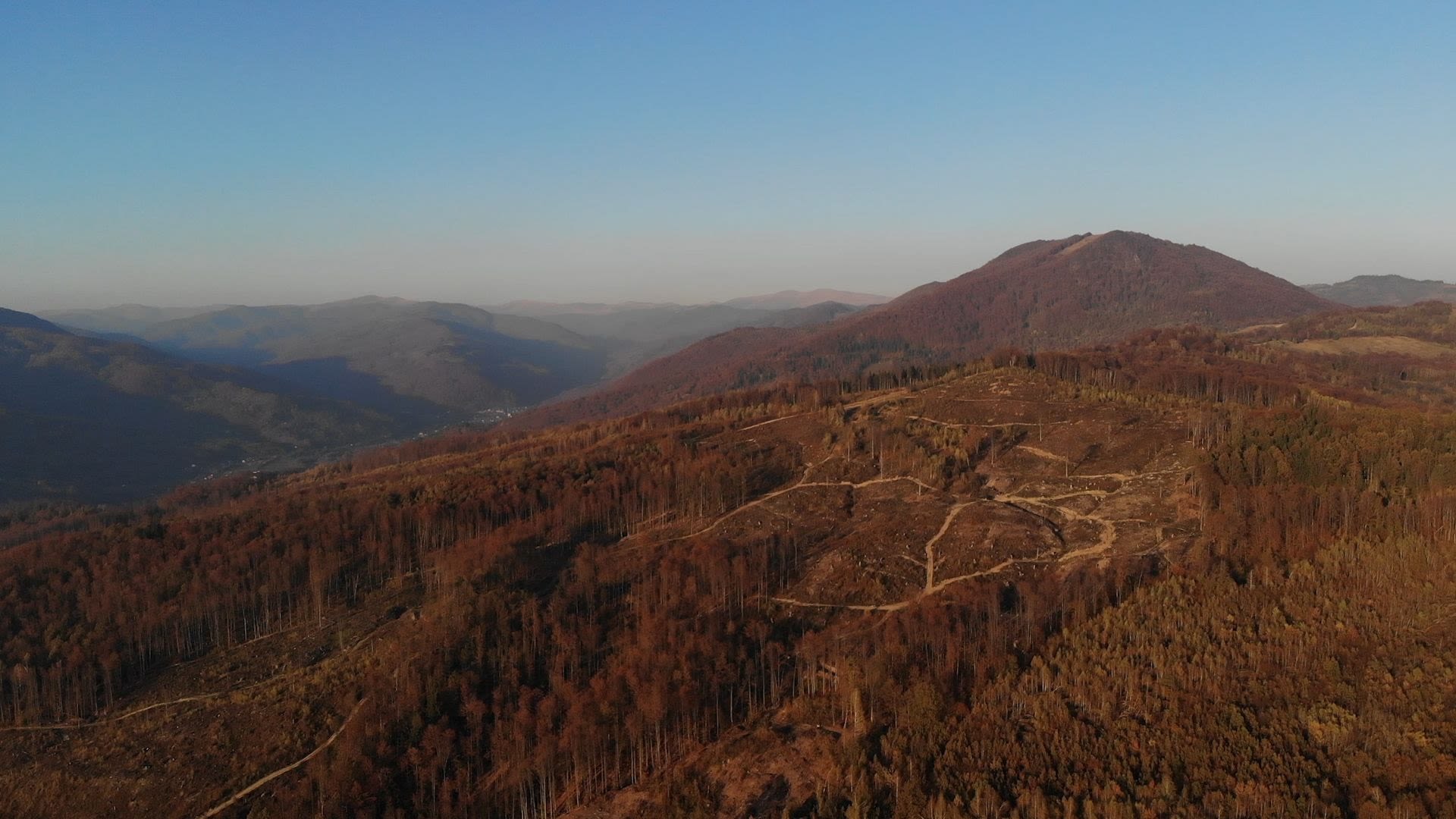
Broken silence: Ikea's Ukrainian wood supply
Earthsight has caught Ikea selling illegal wood laundered by FSC before. Both the furniture retailer and the global wood watchdog ignored important lessons from the scandal and, until they reform, are doomed to keep repeating the same mistakes.
We revealed in an investigation published in June 2020 how some of Ikea's bestselling products, the Ingolf dining chair and folding Terje chair, among others, had been made from illegally felled beech trees from one of Europe's last great forests.
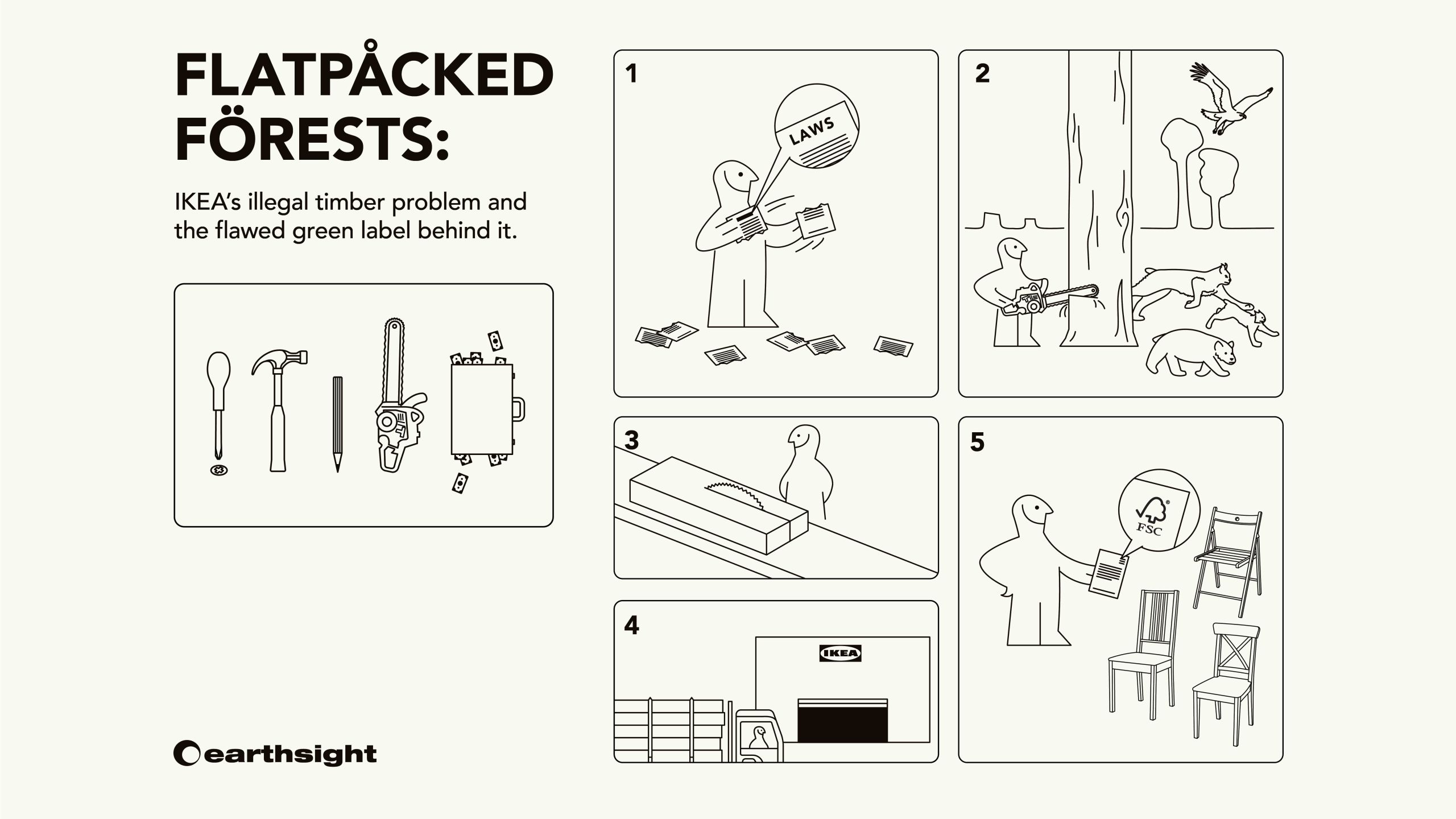
Earthsight report Flatpacked Forests exposed illegal wood from Ukraine in bestselling Ikea furniture © Earthsight
Earthsight report Flatpacked Forests exposed illegal wood from Ukraine in bestselling Ikea furniture © Earthsight
Our report found the world's largest furniture retailer was a major buyer of illegal wood from the once-dense Carpathian Mountains in southwest Ukraine, home to some of Europe's rarest wildlife. The 18-month investigation caught Ikea's suppliers in Ukraine breaking numerous environmental and logging laws.
As in Russia, healthy trees were cut under the false pretext they were diseased or dying out. Such sanitary logging also occurred at a time known as the 'silence period' when it is banned so that animals can breed. And as in Russia, the forests and firms concerned were given the green light by FSC, despite rampant and sustained rule-breaking.
We also demonstrated that it was very likely that FSC-certified logs on which bribes had been paid into the offshore accounts of a corrupt Ukrainian forest minister had made their way into Ikea's products in the past.
Ukraine scandal fallout
Earthsight's investigation into Ikea's wood supply from Ukraine made headlines worldwide and caused a scandal in a country struggling at the time to cope with severe storms and floods in its western provinces.
The Ukrainian Prime Minister, Denys Shmygal, pledged a crackdown on illegal logging in the country days after we published our findings.
While the crackdown was welcome, it did not address the systematic policy flaws at the root of the problem. Five leading Ukrainian civil society groups sought to address this inadequate response in an open letter demanding that Ukrainian authorities implement sweeping reforms to the country's forest sector and calling on the EU to support those changes.
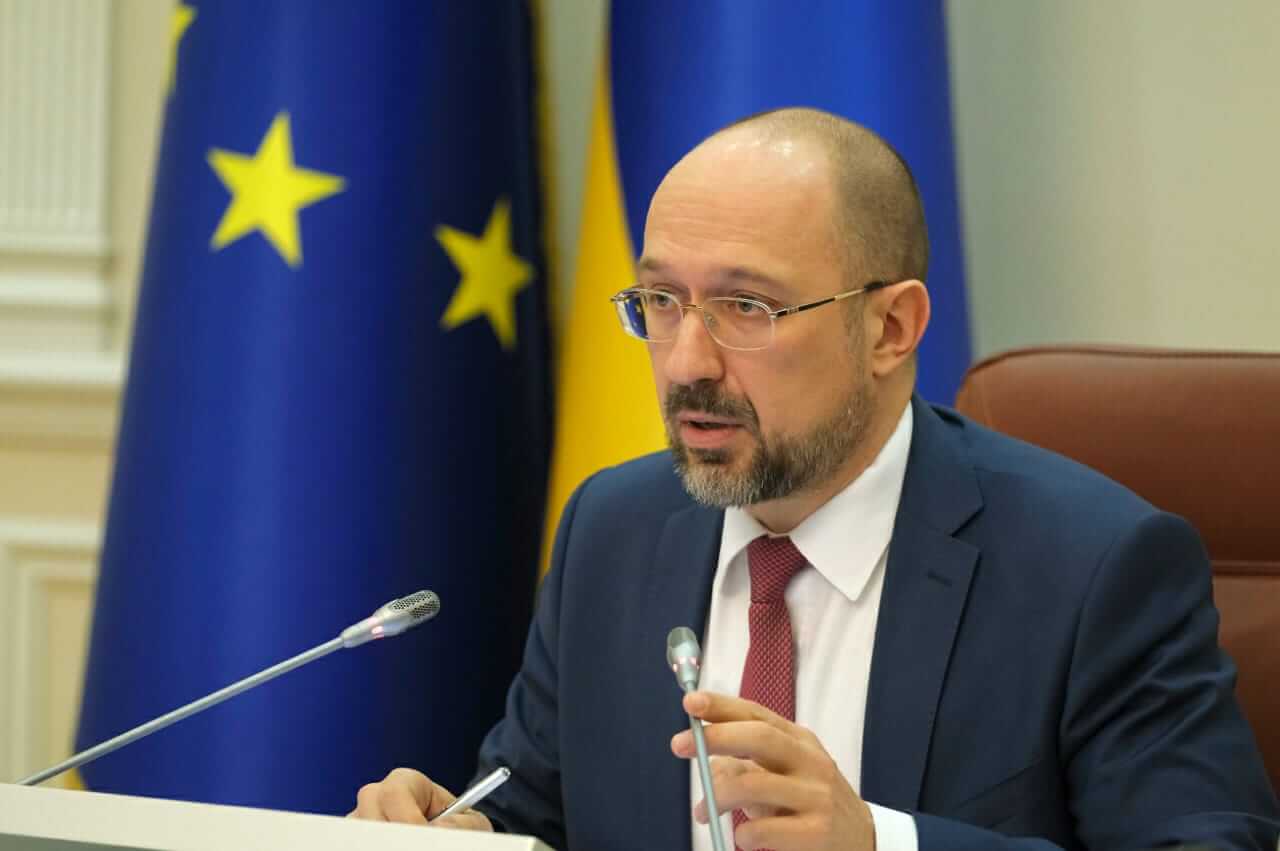
Ukraine's Prime Minister Denys Shmygal pledged a crackdown on illegal logging in the country following Earthsight's 2020 report Flatpacked Forests. Photo: kmu.gov.ua (licensed under CC BY 4.0)
Ukraine's Prime Minister Denys Shmygal pledged a crackdown on illegal logging in the country following Earthsight's 2020 report Flatpacked Forests. Photo: kmu.gov.ua (licensed under CC BY 4.0)
In early 2021, the European Union did make one ground-breaking move in response to Earthsight's reports about Ukraine. The bloc issued a guidance document for Member States acknowledging that neither FSC systems nor government documents could ensure that Ukrainian wood was legal. They said that if companies in Europe were to comply with its law on legality of wood imports, they would have to do a lot more, and if they could not, they must halt purchases.
At the same time, pressure continued from the public and policymakers for Ikea to clean up its act. The Swedish retail giant's role driving deforestation in Ukraine was mentioned in a debate at the European Parliament and more than 200,000 people signed an online petition demanding the brand take actions including setting targets to reduce its wood use and halting timber supplies from virgin forests.
But what of Ikea and FSC themselves? Their responses were at best lacklustre and tried to spin the systemic scandal into the very thing we warned against: a case of a few bad apples.
The rotten apple argument
Our report covered a wide range of Ukrainian supply chains connected to Ikea, and made clear that the issues identified were systematic. It also made clear that the implications went beyond Ukraine, with similar problems very likely to be found in other high-risk Ikea supplier countries like Russia. Ikea and FSC, however, honed in on just one specific Ukrainian supplier and ignored everything else. The narrow scope of their responses ensured that the conditions that created the scandal have not gone away.
Responding to our findings last year, Ikea issued a blanket denial of accepting illegal wood – even as Ukrainian authorities unearthed fresh evidence of lawbreaking by its supplier.
FSC's response, meanwhile, neither welcomed the findings nor promised to look into them. Instead, the wood watchdog shifted into damage-control mode, publishing a 19-page document in an FAQ format skirting well-documented issues and pushing misleading – and in some cases factually incorrect – claims. Earthsight debunked the corporate spin, point by point.
Then, in October 2020, Ikea issued a one-page press release announcing that an internal probe and another conducted by an obscure Ukrainian outfit "showed no indications that illegally logged wood had entered our supply chain." The firm it hired for this purpose also issues FSC certificates to Ukrainian timber companies and forest bodies, an obvious conflict of interest.
Ikea's statement could not be independently verified. Ikea refused to share the reports with Earthsight and other NGOs, claiming that it had to keep the documents secret "to preserve the integrity of the individuals and partners involved, as well as the methods deployed by the auditor for this investigation in Ukraine."
To absolve itself of responsibility for perhaps the most egregious illegality we found in the single supply chain they chose to investigate, Ikea decided that it was better placed to interpret Ukrainian law than a Ukrainian government agency. Ignoring that agency's decision that sanitary felling had occurred illegally during periods when such logging was not allowed, Ikea said instead that the law was unclear and "open to interpretation".
Tellingly, nowhere in its response did Ikea address the need for meaningful reform of FSC. Instead it backed the piecemeal efforts FSC announced in Ukraine, isolated actions that will not make FSC fit for purpose.
The stage was set for another scandal.
6. Conclusion:
Too little, too late
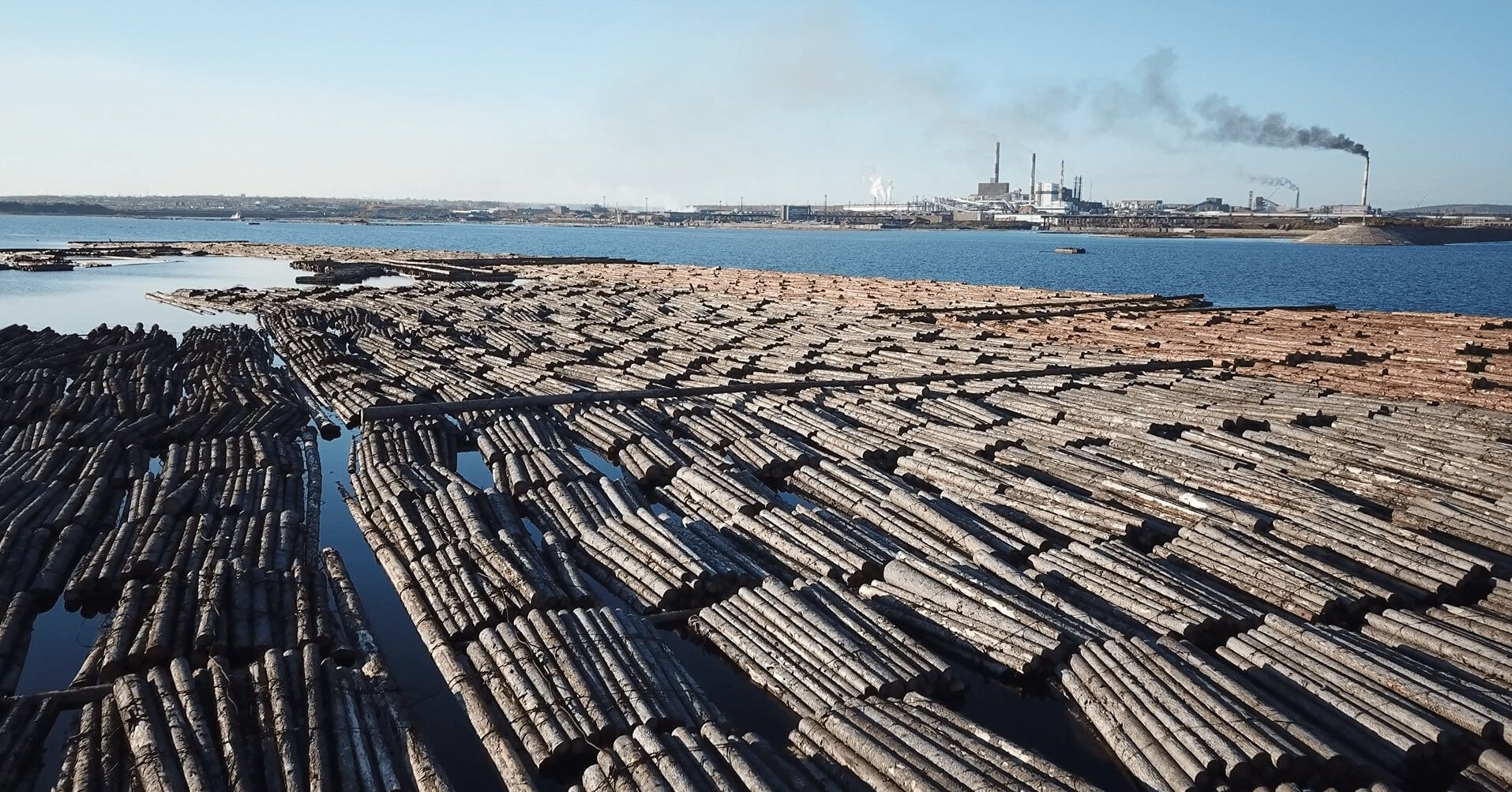
What took you so long?
Earthsight shared the key findings in this report in advance of publication with the principal protagonists, including Ikea and FSC. We sent them to Bakurov too, but he never replied.
In an email response to our findings, Ikea admitted doing business with Bakurov but maintained that "the wood in question which entered our supply chain is legally harvested".
Nonetheless, the retailer went on to say in its email on 15 June that it had been "analysing the forestry sector in Siberia including the practices of the business operator in question [i.e. Bakurov]" for several months and decided to "no longer accept wood from these companies" sometime in spring 2021, citing unspecified "practices of concern". The decision was taken as an "extra safety measure in accordance with our internal Due Diligence System," the statement continued.

Ikea refused to answer additional questions about the exact date it dropped Bakurov's companies as suppliers (which does not rule out the period after Earthsight first got in touch). Source: Earthsight
Ikea refused to answer additional questions about the exact date it dropped Bakurov's companies as suppliers (which does not rule out the period after Earthsight first got in touch). Source: Earthsight
Ikea's statement did not address why it had taken so long to drop its supplier, given evidence of serious illegalities by Bakurov's companies had first become public nearly seven years earlier.
The retailer refused to answer additional questions about the exact date of the decision (which does not rule out the period after Earthsight first got in touch), what exactly the "practices of concern" were, and how and when the company found out about them.
Ikea also claimed that our assessment that the company had failed to address illegalities in Ukraine is "incorrect", though as evidence presented only a claim that the firm had continued to "work to address the issue of conflicting legislation" in the country.
Tech troubles
FSC International's statement on 15 June did not address Earthsight's specific findings about its apparent failure to spot rampant illegal logging conducted by Bakurov's companies, or how illegal wood bearing its logo ended up in furniture stores around the world. The global green label did, however, issue a general statement on its activities in Russia.
"FSC is aware of the risks associated with partial certification in forests within countries where local law enforcement is weak," FSC's head office in Bonn, Germany, said in the statement. "We acknowledge that this potentially poses a risk to FSC System Integrity and we are looking at ways of mitigating these risks in different ways."
Disappointingly, none of the examples cited by FSC look likely to achieve this.
FSC told Earthsight it has used scientific tests to check wood species and origin, but the weblink they provided suggests this technology is a service they offer to companies rather than an enforcement mechanism. The tests would also have been meaningless in both the Russia and Ukraine cases involving Ikea which Earthsight exposed, neither of which involved false claims over wood species or origin.
FSC's response to Earthsight. Source: Earthsight
FSC went on to say that its existing (read: unsystematic) use of Transaction Verification is "evolving into a more systematic approach through Blockchain", which it is currently piloting in Ukraine and China. Again, the technology would have made no difference in this case. No technology, however flashy, can tell auditors whether the harvest data a logger enters into the FSC system is actually true. Plus, FSC has not committed to making any kind of transaction verification a standard part of its systems. Without such a commitment, these technologies are little more than a public relations exercise.
Something similar can be said of another recent development FSC was keen to highlight, a GIS portal for use by certification bodies which shows maps of tree cover loss. In fact such maps – notably WRI's Global Forest Watch – have been readily available for the best part of a decade. The problem is that auditors are not required to use them – something that remains unchanged. FSC isn't even willing to demand that certified companies publish the boundaries of their forests.
In its statement, FSC also stressed that it had been working to study and seek to better address the problem of illegal sanitary logging (for more details, read FSC's full response to Earthsight here). Though the sustainable wood label claimed that it can help companies carry out the 'due diligence' checks required by the EU Timber Regulation (EUTR) because its supply chains "mitigate risks of illegal timber", it acknowledged that retailers and other companies importing wood or wood products from high-risk countries like Russia must perform additional checks to comply with the EU import law or other equivalent international regulations.
Blame game
FSC's wider response to our findings was characterised by a combination of buck-passing and panic.
In its official statement, FSC International seemed to imply that blame for poor oversight of Bakurov's companies lay with its subcontracted auditors in Russia.
The FSC head office stressed that it was "not directly accountable for non-compliance of third parties", like the certification bodies carrying out annual audits on the ground. It also said certification bodies do sometimes "overlook or miss non-compliance", though without admitting this was the case here.
"FSC is not directly accountable for non-compliance of third parties"
The certification body concerned, meanwhile, threw the blame right back. In its response to Earthsight, Forest Certification LLC on 14 June did not deny being aware of the illegalities happening in Bakurov's uncertified forest leases, but instead stressed that [according to FSC rules]: "one legal entity [i.e. Vilis] cannot be held liable for another legal entity just because they are owned by the one owner."
Even though Forest Certification claimed its inspections of Vilis sanitary felling sites "did not reveal any violation of legislation", it was at pains to emphasise that FSC "does not require specialised forest pathological measures at the level of specific felling." Auditors, it added, therefore relied primarily on official documents and consultations with stakeholders to assess whether such logging was legal. The certification body also blamed Russian officials for interpreting contradictory laws differently to each other. Such situations, it said, meant certain practices once considered legal were "suddenly" reclassified as breaking the law. Yet in the next sentence, the company claimed to apply a "risk-based approach" to assessing clients. If this was true, then why didn't Bakurov's certified firm Vilis represent such a "risk"?
"One legal entity cannot be held liable for another legal entity just because they are owned by one owner"
Adding to the confusion, a strange thing happened at the very same time FSC and its auditors fired off responses to Earthsight denying any wrongdoing and insisting all was well. Without any warning or explanation, the FSC certification for Bakurov's company Kalinov Most (which now holds the remaining certified leases previously held by Vilis) was quietly terminated. A webpage on the green label's online database of certificates was updated on 15 June to reflect the change, which went unmentioned in both parties' official responses. Earthsight could find no public summary or other document uploaded to explain the move. We doubt the timing is a coincidence.
Still, at least FSC were kind enough to respond to Earthsight's request for comment. A similar email sent to their business rivals, PEFC, went unanswered.
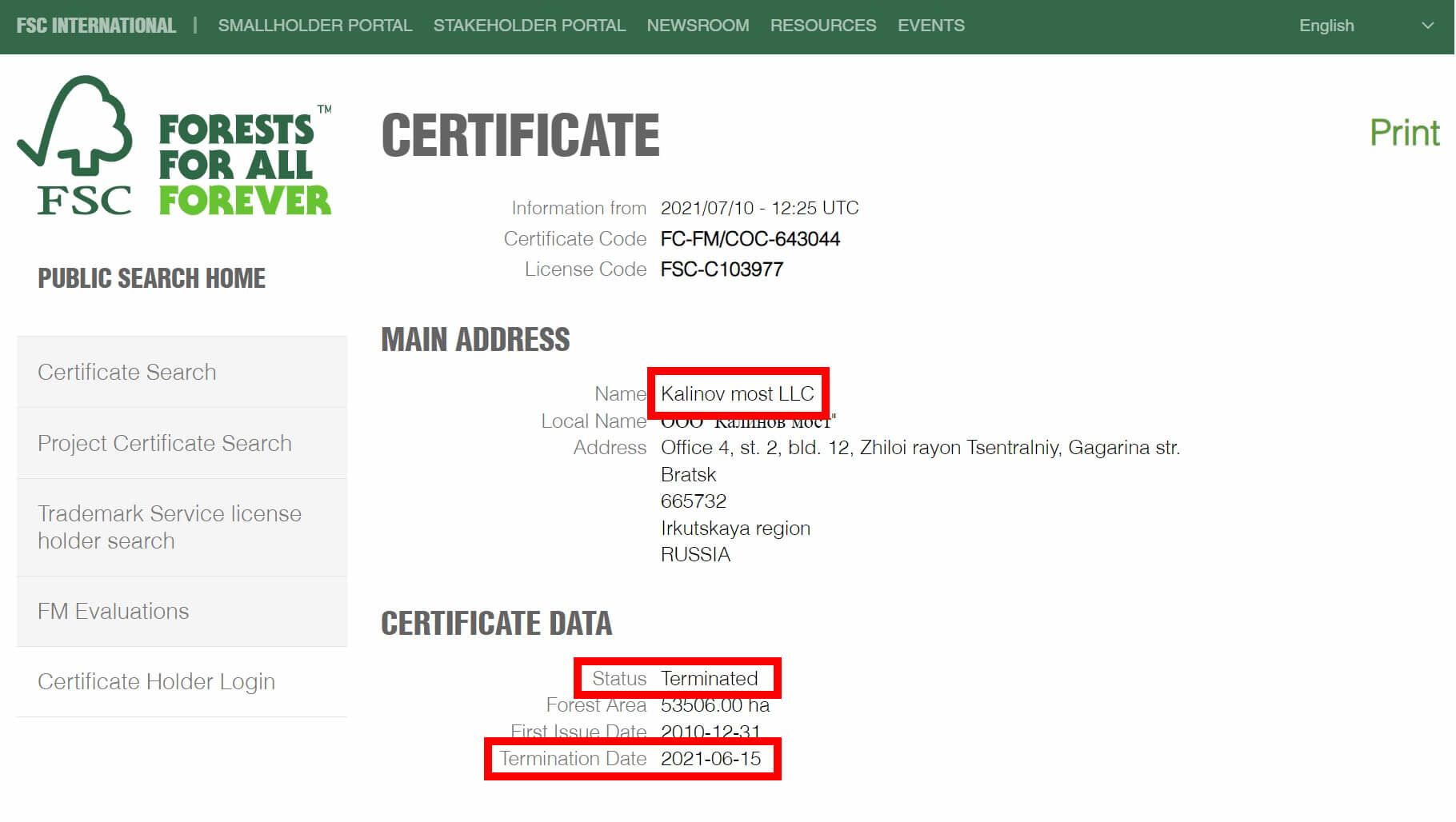
FSC certification for Bakurov company Kalinov Most (which now controls the remaining certified leases previously held by Vilis) was quietly terminated at the same time FSC and its auditors sent statements to Earthsight denying wrongdoing and insisting all was well (screenshot taken 10 July). Source: FSC
FSC certification for Bakurov company Kalinov Most (which now controls the remaining certified leases previously held by Vilis) was quietly terminated at the same time FSC and its auditors sent statements to Earthsight denying wrongdoing and insisting all was well (screenshot taken 10 July). Source: FSC
Root and branch reform at FSC
Panic, passing the buck and scrapping one certificate years too late will not solve the entrenched problems facing FSC, in Russia or more widely. As Earthsight documented in our 2020 Flatpacked Forests report, FSC's failures are not just limited to Russia and Ukraine. Illegal logging. Corruption. Human rights abuses. Precious rainforests razed. Beatings and murder of forest communities. You name the crime and companies carrying the FSC logo have been accused of being complicit in it.
When the timber trade remains a major driver of global deforestation and forest degradation, processes which are in turn responsible for one tenth of climate-changing emissions, what's happening in forests certified by FSC has consequences for the whole world. Given that FSC encompasses between one-fifth and one-quarter of the world's industrial wood production, and likely a much greater share of wood imported and sold in Europe and the US, when its auditors allow the wholesale plunder of precious forests, whether knowingly or not, the environmental costs are huge.
As the Flatpacked Forests report explains in more detail, the good wood label's issues stem from its failure to address its fundamental flaws.
The FSC stamp and standards, backed by the retail giant Ikea, thus provide false reassurance to shoppers concerned about the environmental impact of the books, napkins, paper, straws, wardrobes and other wood products they buy. The clean, green logo hides an ugly reality.
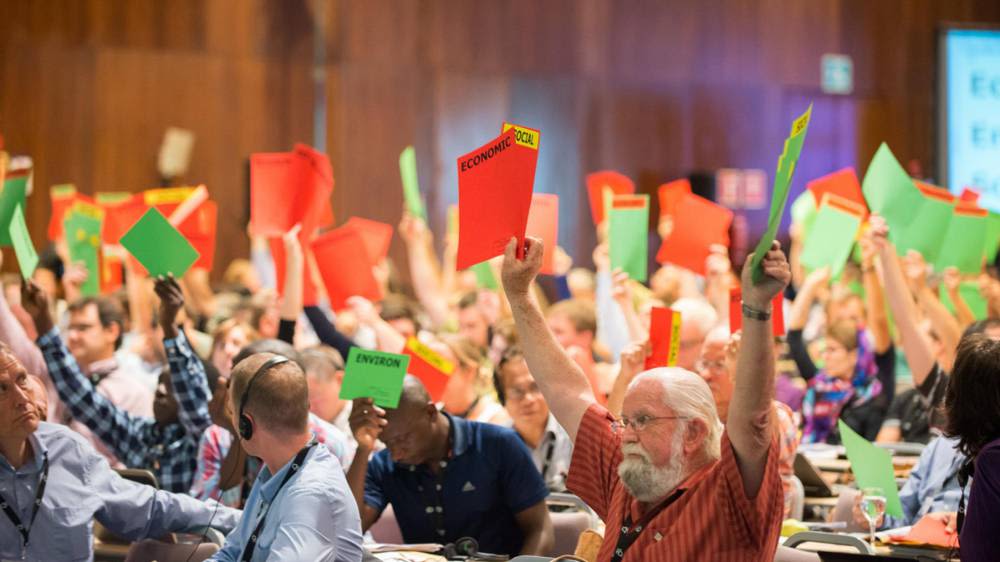
FSC members vote on a motion © FSC Russia
FSC members vote on a motion © FSC Russia
The Bakurov case provides further evidence of the urgent need for deep-rooted reforms – a complete overhaul of systems and procedures to prevent FSC rubberstamping more stolen trees into our children's bedrooms.
FSC needs above all to stop denying its problems or believing they can be fixed with a generous smattering of technological wizardry. Immediate actions it could take include forcing auditors to make routine use of satellite imagery, court documents and media reports when conducting audits, and to clarify partial certification rules to avoid someone like Bakurov running roughshod over them.
But such small, procedural steps won't be enough. The forest certification scheme must also address its structural flaws. This may be hard, as the organisation's industry members will need to be on board for the necessary steps to be approved in votes at FSC's General Assembly. But if FSC is to retain any credibility, such reforms are essential. Necessary changes include making transaction verification compulsory, shifting the burden of proof for serious illegalities and removing the conflict of interest at the heart of the system regarding how auditors are paid.
Taming the tree-munching machine
Though its response to Earthsight's findings did not acknowledge any wrongdoing or fault on its part, Ikea's actions since suggest that it is finally, belatedly realising that it has a real problem on its hands.
Rushing to get ahead of the coming scandal after being alerted to our findings in advance, Ikea on 29 June 2021 announced a raft of new steps clearly triggered by them. The company announced that it would increase its own audits of supply chains in high-risk countries by 30 per cent, third party audits by 50 per cent and unannounced supplier audits by at least 20 per cent. It also announced plans to make greater use of technology to verify its wood supplies.
Most importantly, Ikea declared an immediate ban on the use of sanitary-felled wood from the Russian Far East and Siberia.
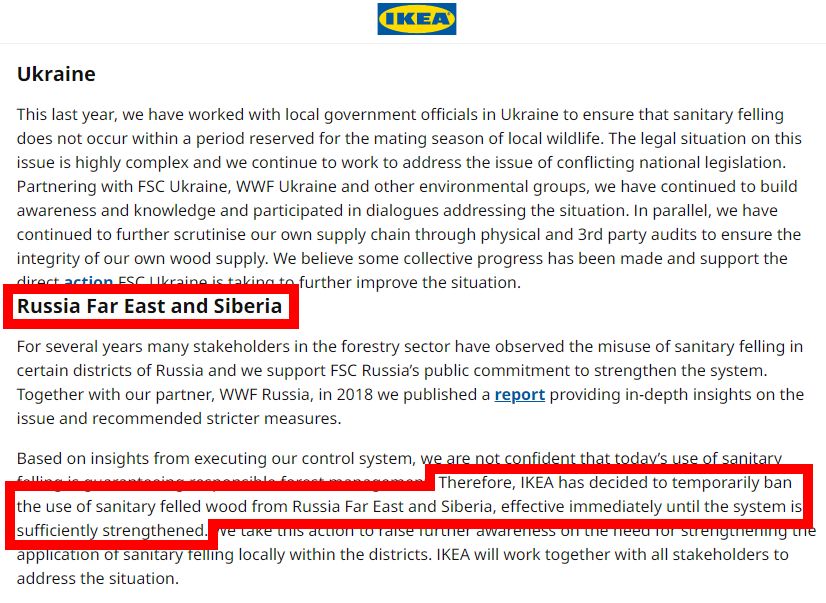
Ikea declared an immediate ban the use of sanitary-felled wood from the Russian Far East and Siberia after Earthsight alerted the retailer to our findings. Source: Ikea
Ikea declared an immediate ban the use of sanitary-felled wood from the Russian Far East and Siberia after Earthsight alerted the retailer to our findings. Source: Ikea
But these steps, while welcome, won't prevent the Swedish giant being embroiled in further scandals. Sanitary-felled wood from elsewhere in Russia is also at high risk of illegality, but remains welcome in Ikea's products. There are illegalities aplenty relating to non-sanitary felling as well. Given the propensity for fraud by Russian loggers, it is also unclear how Ikea can ensure that sanitary-felled wood is not laundered as originating from other types of logging and therefore able to continue entering its supply chains. More audits won't help if they aren't better designed, more meaningful and more independent as well. Throwing technology at the problem will be no more effective for Ikea than it will for FSC, for reasons previously mentioned.
By trying to work around FSC's flaws without publicly acknowledging them, Ikea is also failing in its wider responsibilities. As by far its biggest supporter and consumer, the global furniture giant has the power to drive change at FSC. The retailer must demand the necessary reforms – and threaten to ditch the green label if they are not achieved within a given timeframe.
Ikea should publicly acknowledge that the Bakurov case represents a serious failure of policy implementation by both it and FSC. It should then commission a truly independent audit of its wider purchasing in Russia, to include inspections of FSC certified supplier forests. It must then publish a summary of the results, and explain how it will address them.
"Ikea should publicly acknowledge that the Bakurov case represents a serious failure of policy implementation by both it and FSC"
Ultimately, however, Ikea needs to go beyond even these steps. It needs to acknowledge that buying FSC-certified materials will never be enough to ensure its wood consumption is environmentally sustainable.
The root of the problem lies in the retail giant's 'fast furniture' business model. Though the brand has piloted schemes like leasing or buying back some used furniture, they account for a marginal share of its overall operation. The company is the world's largest wood consumer, munching through a mind-boggling 21 million cubic metres of the stuff in 2019 – roughly equivalent to one tree every second. Wood products make up three-fifths of the company's sales.
This appetite is huge – and expanding. To maintain growth, Ikea must keep finding new sources of timber. Its published reports suggest its wood consumption doubled in the last decade and each year the company consumes between 1.8 million and 2.5 million trees more than the previous one.
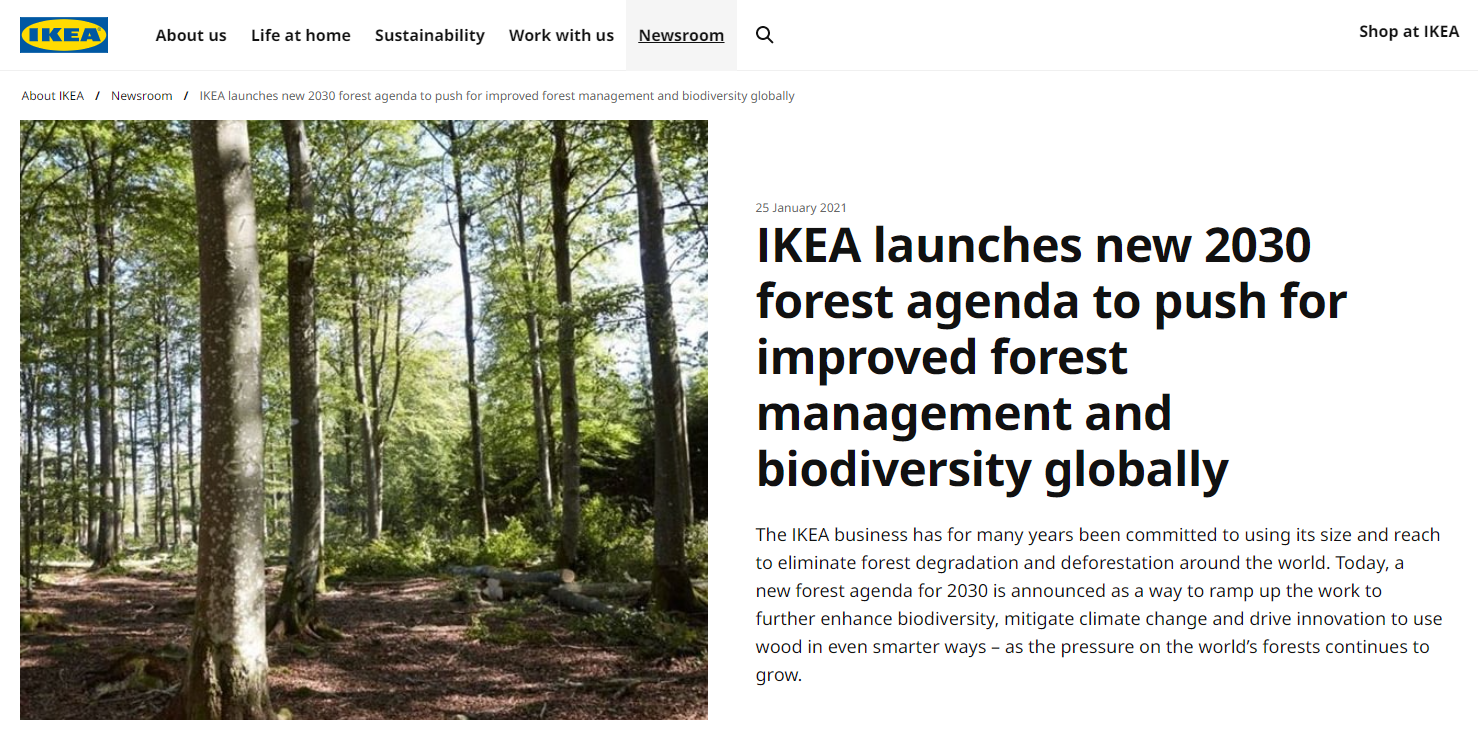
Ikea's '2030 Forest Agenda' was a tacit admission that FSC certification alone cannot ensure its wood consumption is sustainable. Source: Ikea
Ikea's '2030 Forest Agenda' was a tacit admission that FSC certification alone cannot ensure its wood consumption is sustainable. Source: Ikea
Like other behemoth brands, Ikea exerts a relentless pressure on the vast pool of contractors competing for its business. Its relentless, and growing, demand for cheap, sustainable wood encourages its business partners to cut corners to keep up supplies. Earthsight has previously shed light on Ikea's near monopolistic power over suppliers. For a supplier, deceiving a multibillion-dollar brand on sustainability is risky; but refusing to give it what it wants, suicidal. Forced to choose between environmental standards and bankruptcy, a supplier may see felling trees against the law as a no-brainer.
Ikea did take one broad positive step following our report, when in January 2021 it announced a new 'Forest Agenda 2030' including a commitment to source a third of their wood raw material from recycled sources by that date. This was a welcome, albeit tacit, admission that FSC certification alone is not enough. But it is a disappointingly low target, considering that 12 per cent of the firm's wood is already from recycled sources.
They need to go much further. To address its outsize impact on the world's forests, Ikea must commit to a timebound plan to first eliminate all sourcing of wood from relatively intact natural forests, then eliminate all wood from any natural forests, and ultimately source all wood from recycled sources. High-risk countries like Russia should be a priority throughout this process, rather than – as at present – being expected to do much of the heavy lifting in supplying Ikea's ever-growing appetite for wood.
The importance of government action
In all Earthsight's stories, one lesson shines through: the vital importance of action by governments.
If humanity is to avoid catastrophic climate breakdown, this is the only way it will happen. And what is true of global heating more broadly is equally true of this specific case.
The Russian government must act urgently to address the rampant illegality, corruption and environmental degradation in its forest sector, but so, too, must the countries consuming cheap Russian wood.
In Russia, the government must impose a temporary ban on sanitary felling in Irkutsk Oblast to let the province put its house in order. This will involve steps including the implementation of a requirement to make pathology reports and inspection reports relating to sanitary felling publicly accessible, and ensuring that regional forestry authorities do not depend on taxes on timber from this kind of harvesting for funding.
"If humanity is to avoid catastrophic climate breakdown, government action is the only way it will happen"
As the non-profit Environmental Investigation Agency (EIA) points out, FSC's outward appearance of good forest management and sourcing practices doesn't just fail to protect forests in Ukraine, Russia and other countries around the world – it undermines meaningful efforts to do so. Why should countries plagued by illegal logging try to tackle the problem when suspect wood can hide behind FSC branding and retain access to lucrative international markets like the EU? As well as hoodwinking eco-conscious consumers and businesses, FSC increasingly undermines timber import laws in major wood-consuming markets like Europe and the US.
Laws like the EU Timber Regulation (EUTR) and US Lacey Act ban illegal wood from overseas and force importers to carry out 'due diligence' into their supplies. Under EUTR, for instance, these checks must reduce the risk of placing illegal wood on the trade bloc's market to a 'negligible' level. Meeting this threshold requires a much higher level of traceability, knowledge of suppliers and transparency than FSC papers provide.
The European legislation is clear: third-party certificates like those from FSC alone do not prove that a company complies with the rules. But most wood importers – and many of the bodies enforcing EUTR in each member state – treat them like they do. This has been actively encouraged by FSC in the past, including in Russia.
The gap between EUTR requirements and how they are enforced has caused a surge in demand for FSC certificates, including in corrupt countries like Russia and Ukraine. Today, pretty much every wood importer in Europe and the US has FSC certificates to hand.
"The EU, UK and US have the power to drive change in Russia and elsewhere"
This arrangement benefits FSC and Ikea, which have both lobbied for EUTR to formally recognise FSC. This would effectively make it exempt from supply chain checks, if not in principle then in practice. Given the serious flaws in certification schemes like FSC it is all the more important that authorities in key western markets step up their scrutiny of companies that import timber from countries with weak forest governance.
Using the laws they already have on the books, places like the EU, UK and US have the power to drive change in Russia and elsewhere. They must implement those laws more rigorously. If that means Russian wood loses markets and value until reforms are made, so be it.
Asked whether better enforcement of these laws could drive Russian authorities to take a stronger stance and thereby protect Russia's forests, Alexey Yaroshenko of Greenpeace Russia was categorical. "Yes," he said. "At the very least, this will make officials pay attention to the problems that now remain hidden and ignored."
It took the EU more than two years to start taking meaningful action on Ukraine in response to our findings. It needs to work faster this time.
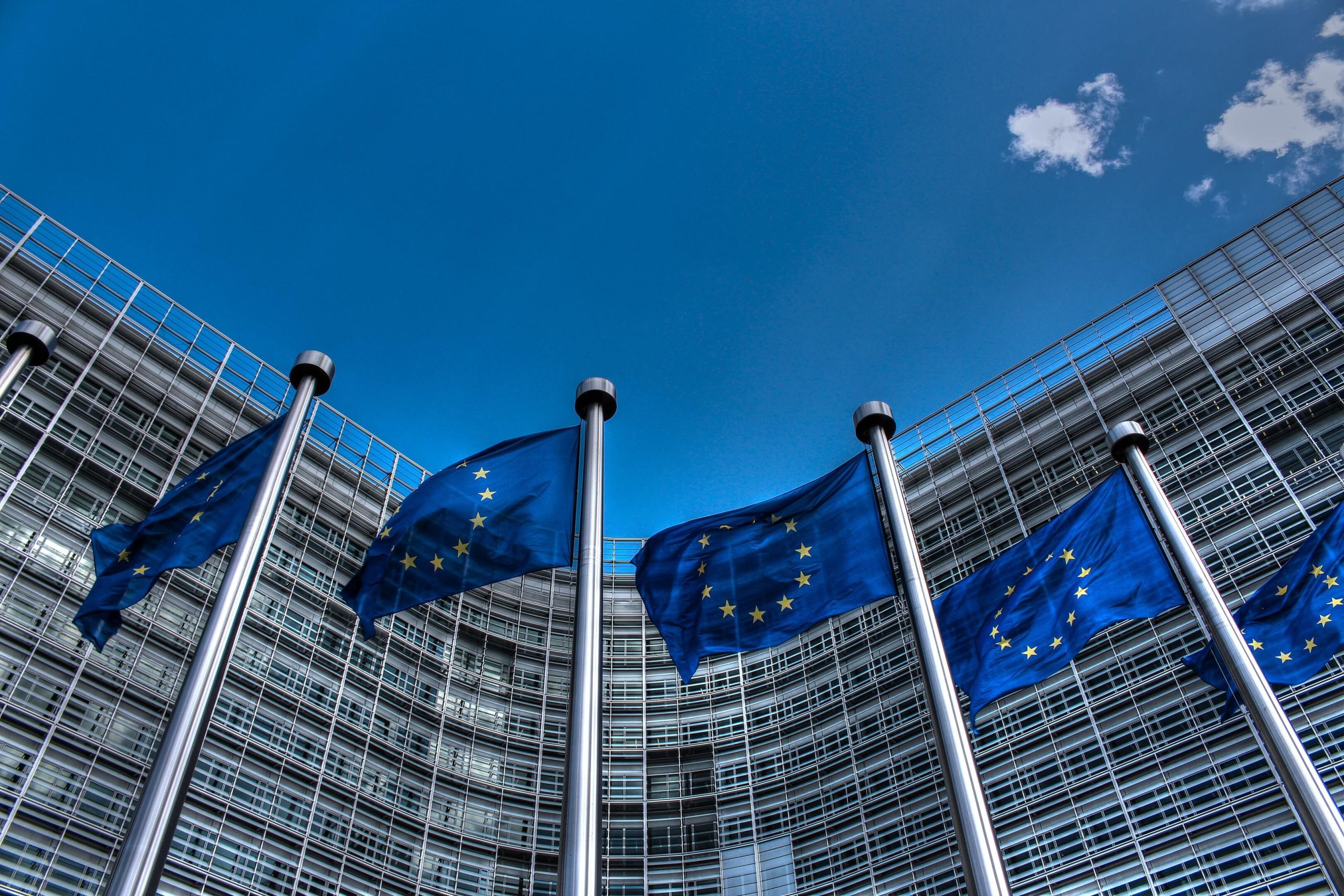
Recommendations
Detailed recommendations for the Russian government, FSC, Ikea and other importers and retailers, as well as consumer country governments, are provided here.
- Click here to read Ikea's response to Earthsight
- Click here to read FSC's response to Earthsight
- Click here to read Forest Certification's response to Earthsight
- Click here to read PT Karya Sutarindo's response to Earthsight
July 2021
Credits
Cover art and supply chain illustration: Matt Hall
Opening montage images: ExportLes / Julia Kiseleva / YouTube; Nina Aldin Thune (licensed under CC BY 2.5); Earthsight
European Union flags photo: Thijs ter Haar (licensed under CC BY 2.0)
Floating log rafts near forest photo © Earthsight
Film trailer: Leo Plunkett
Maps: Dirk Wright
